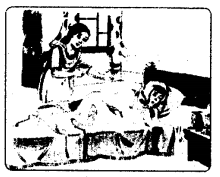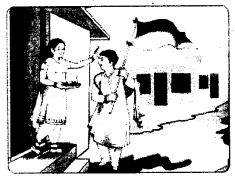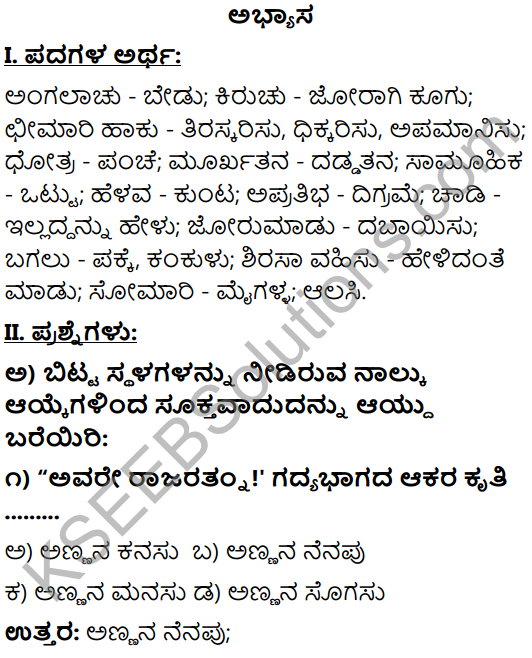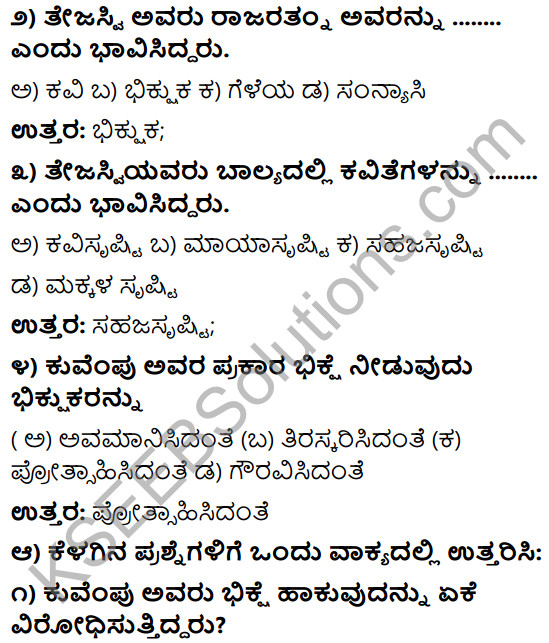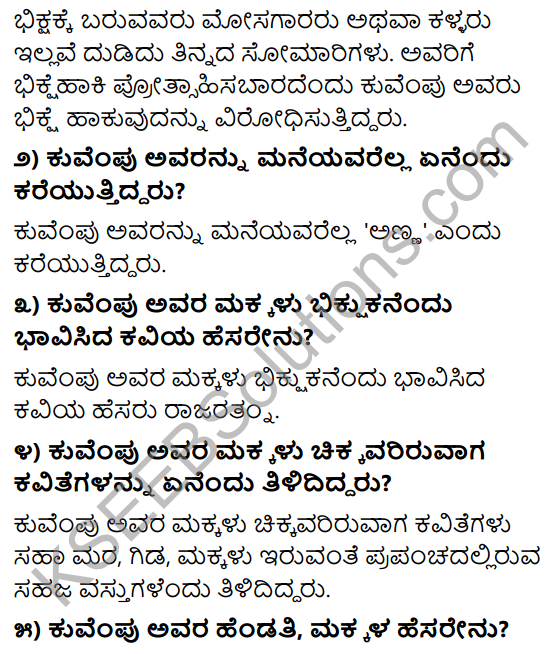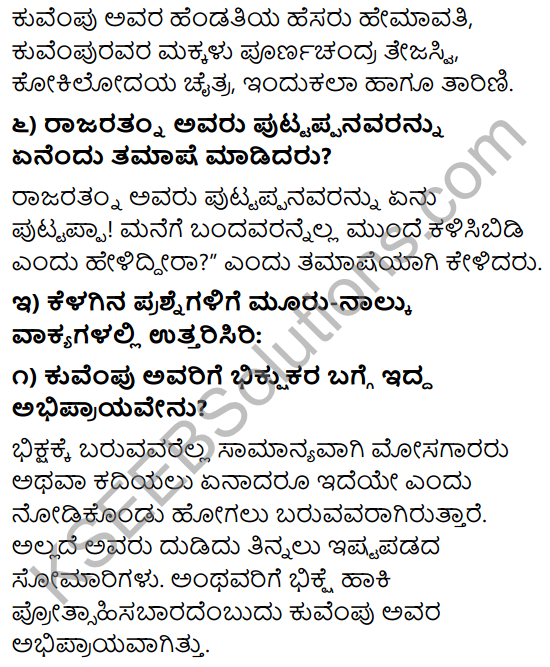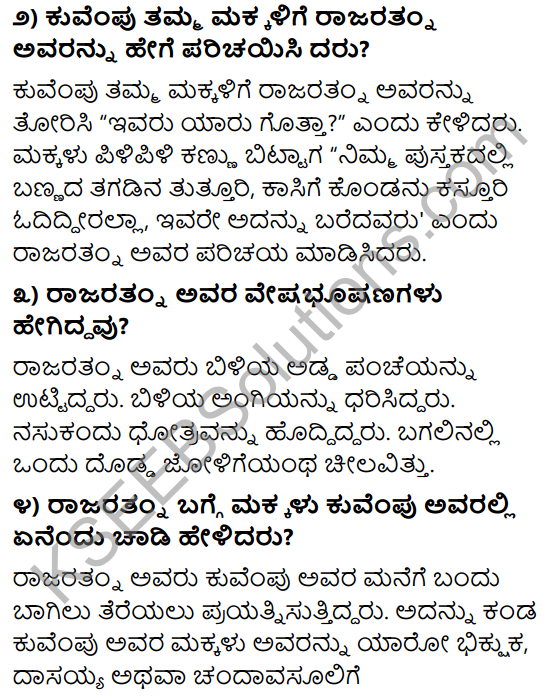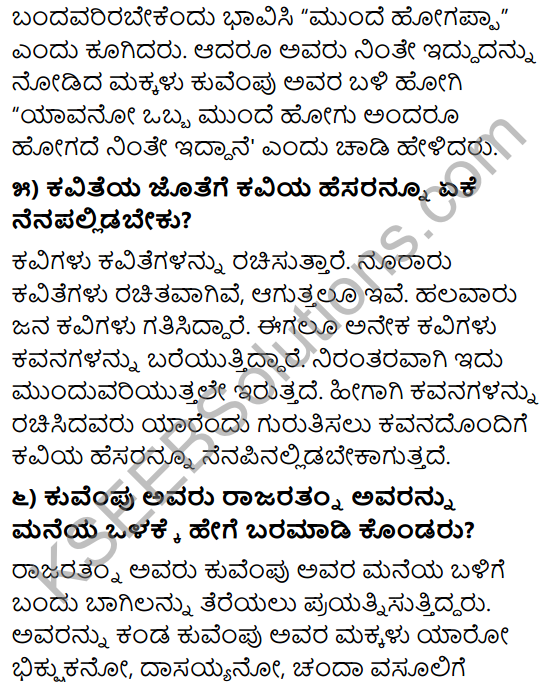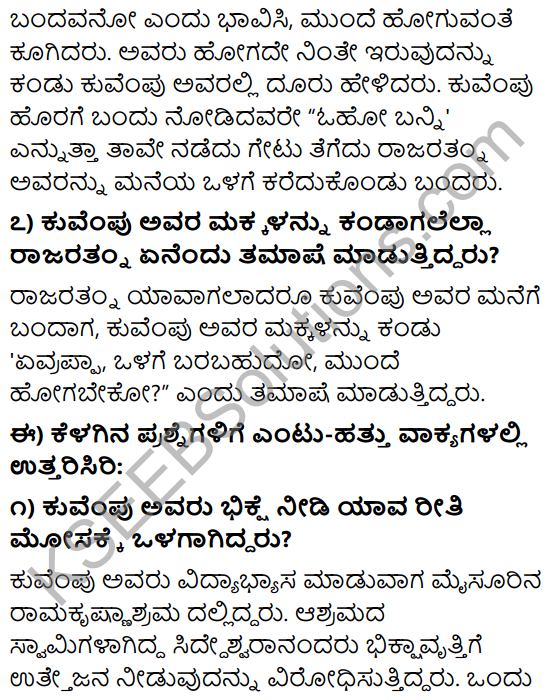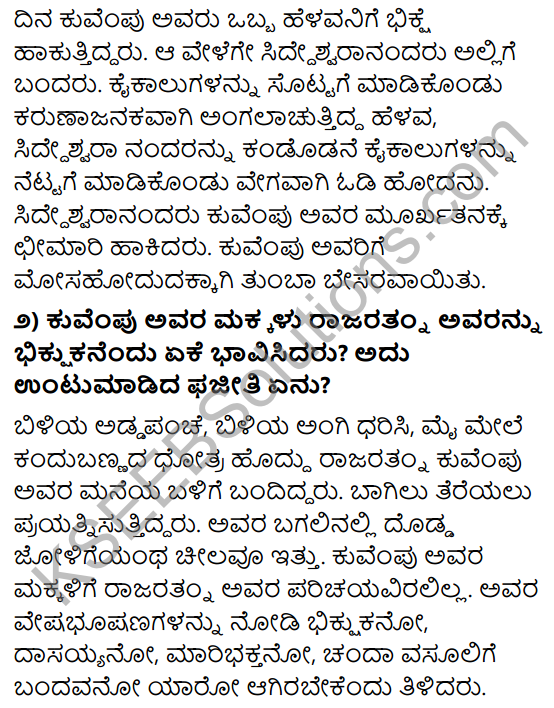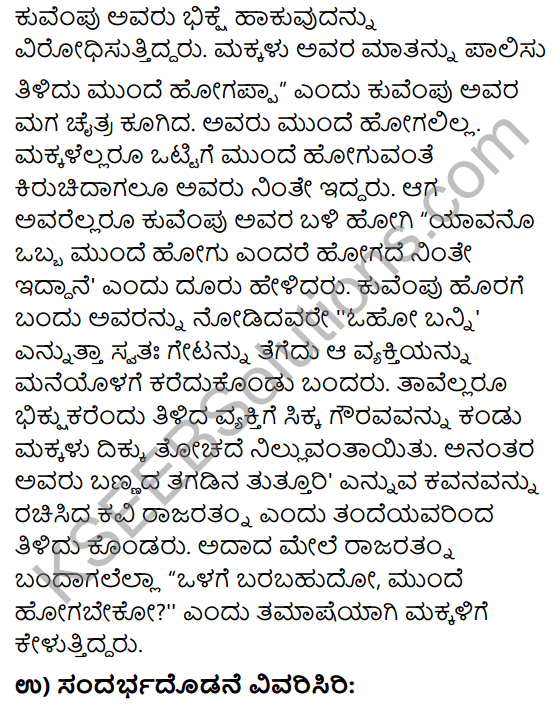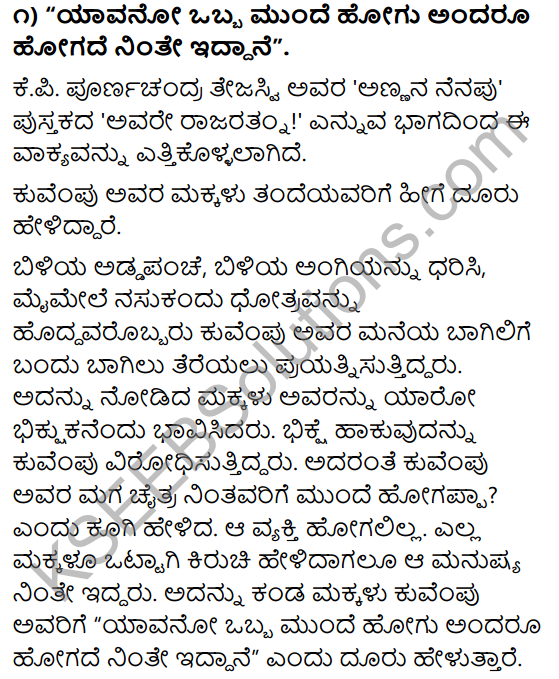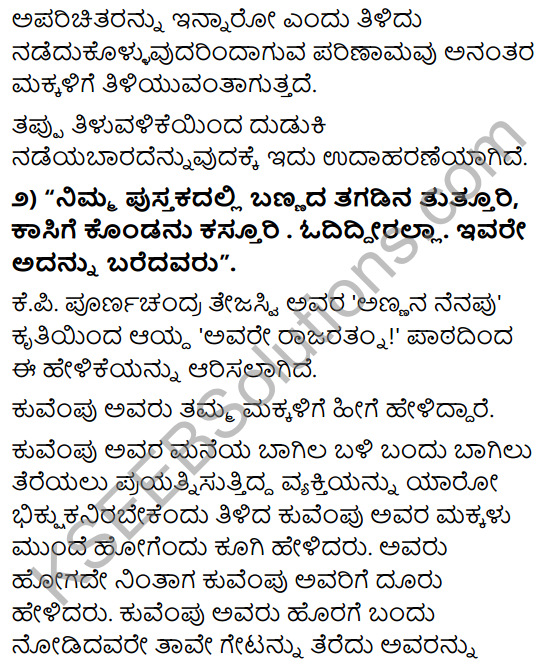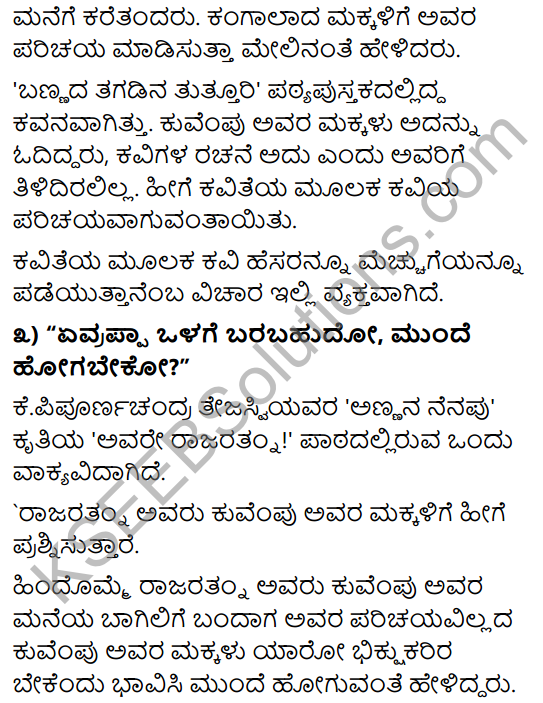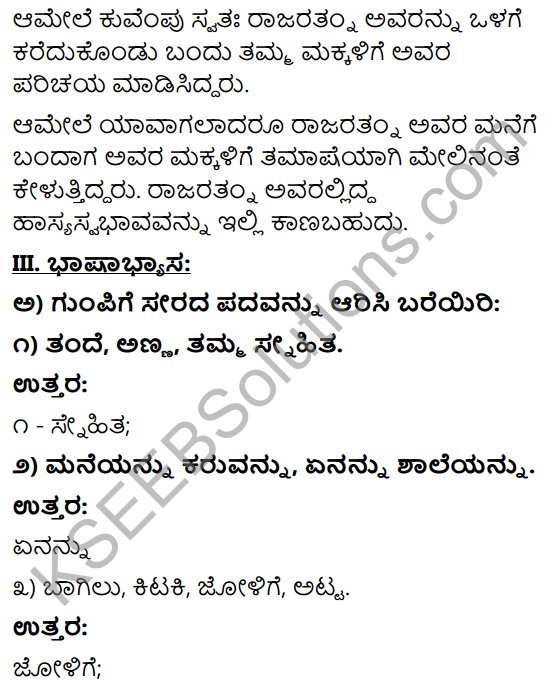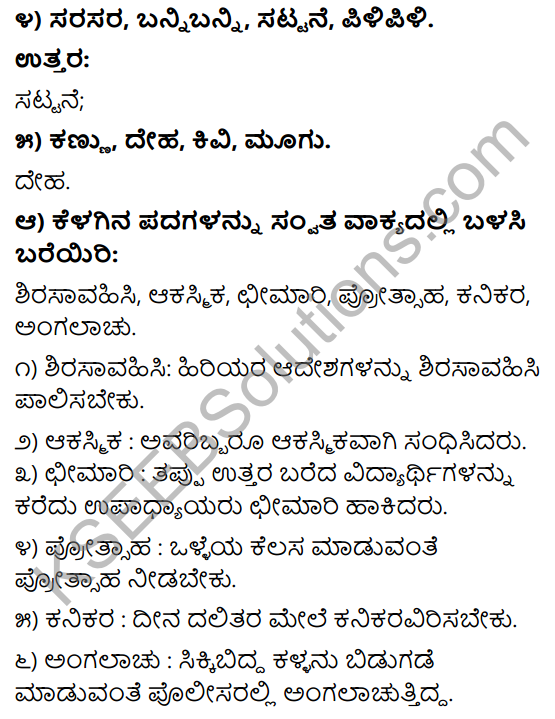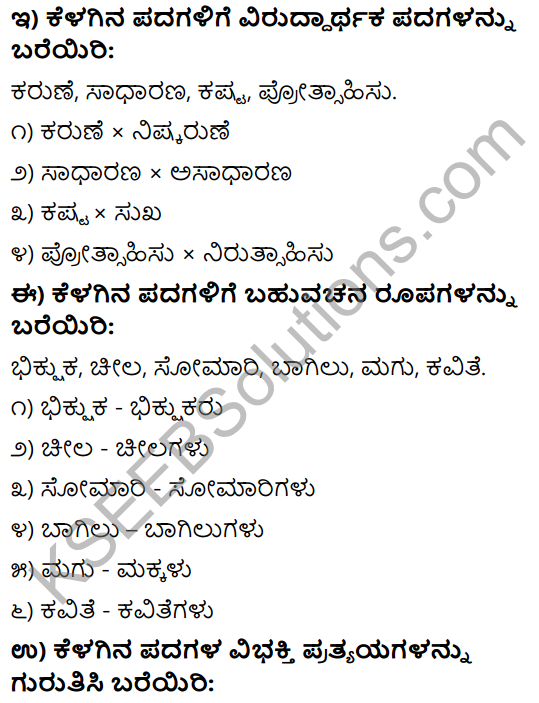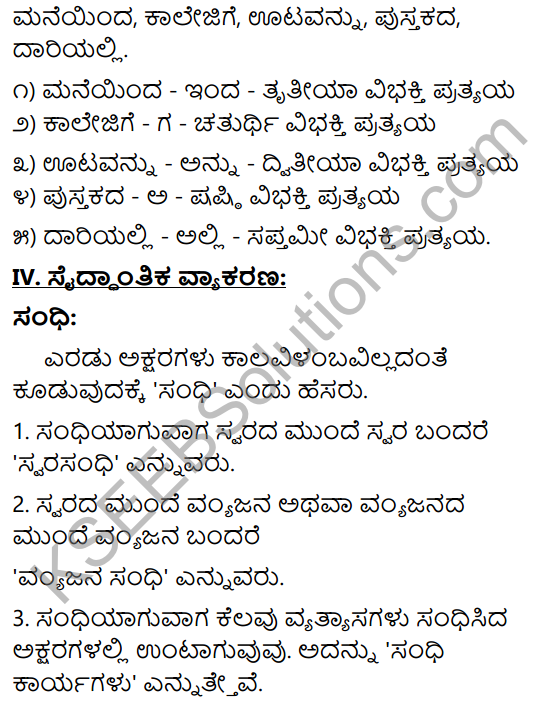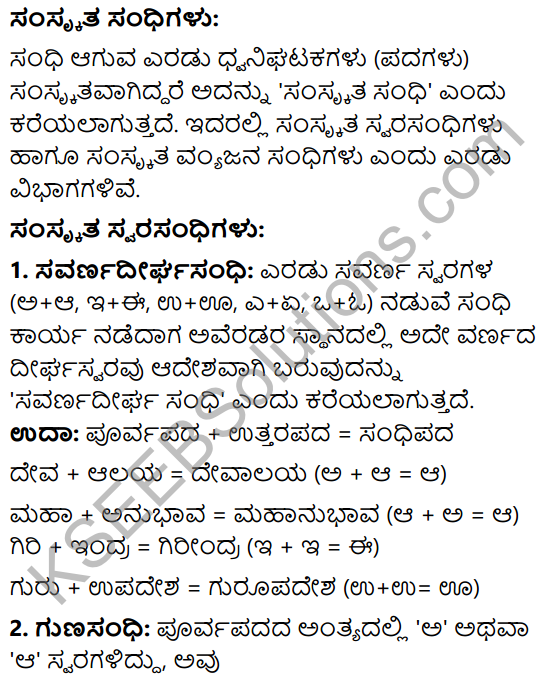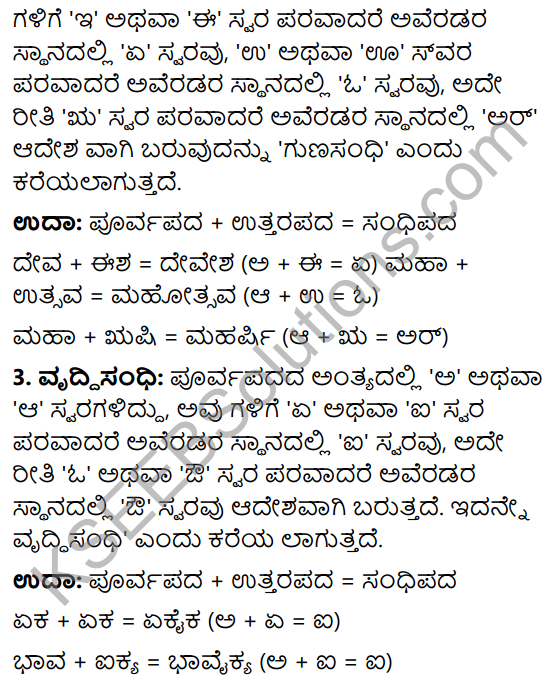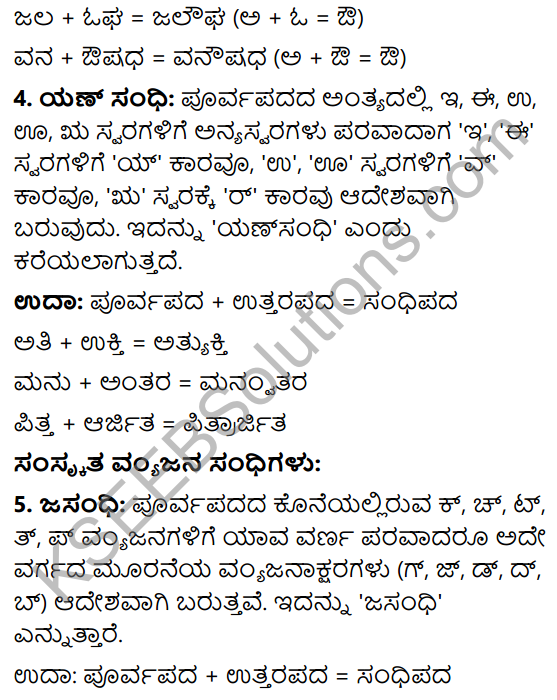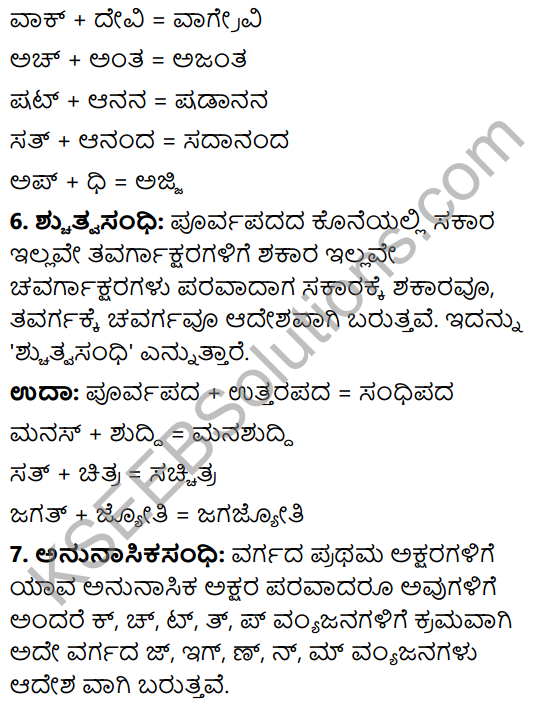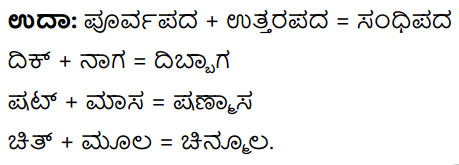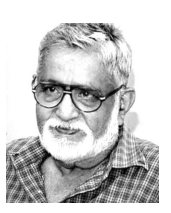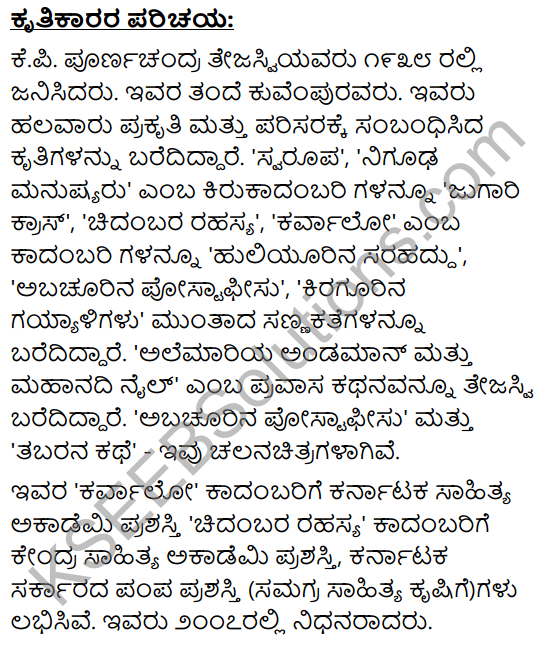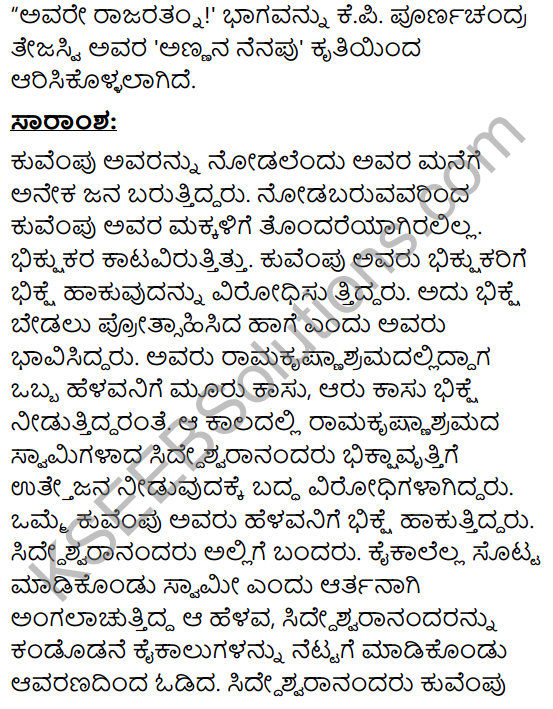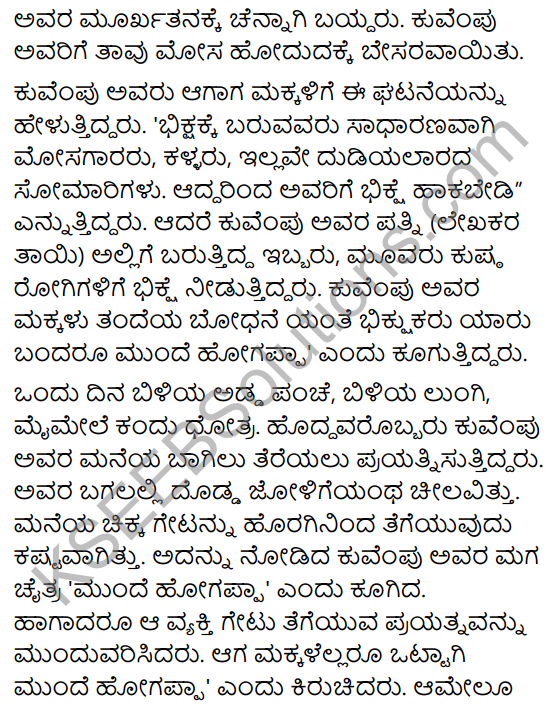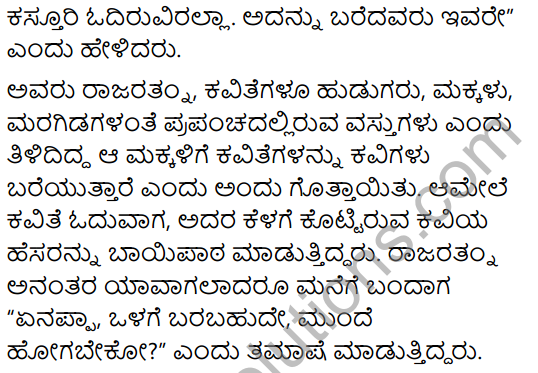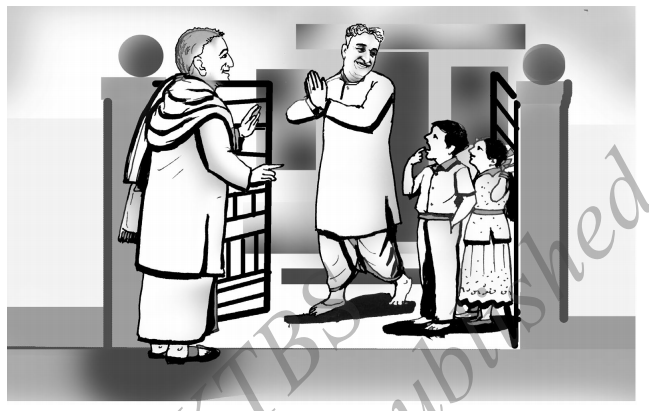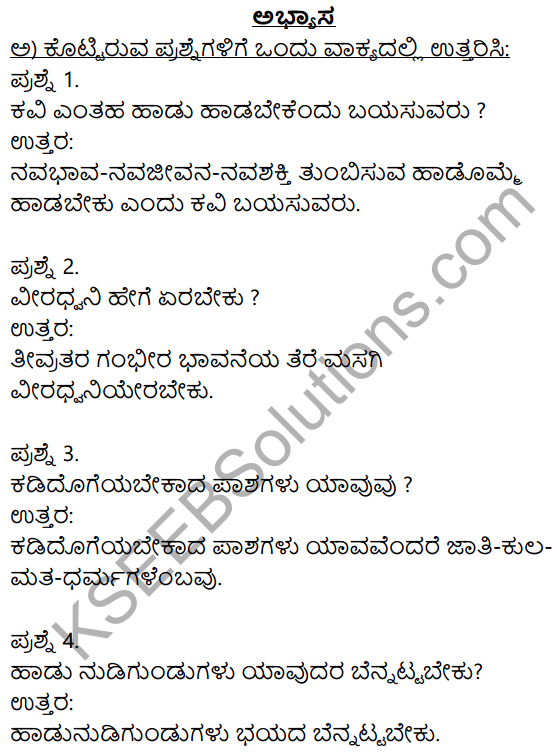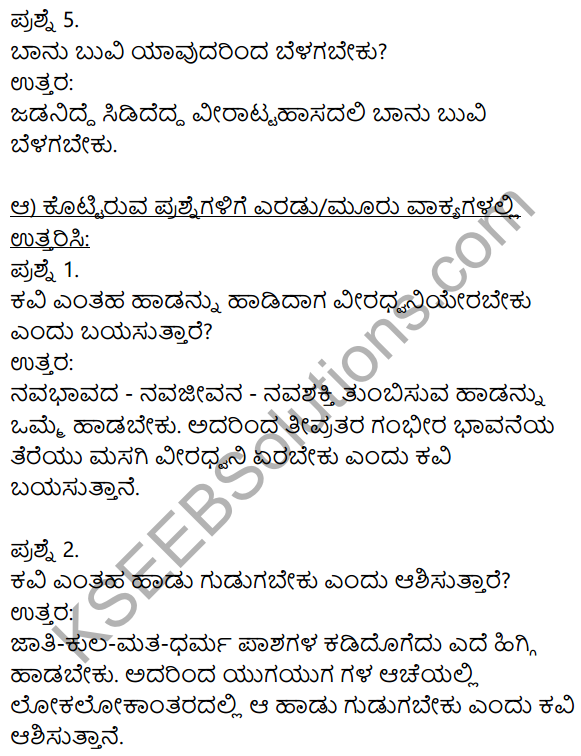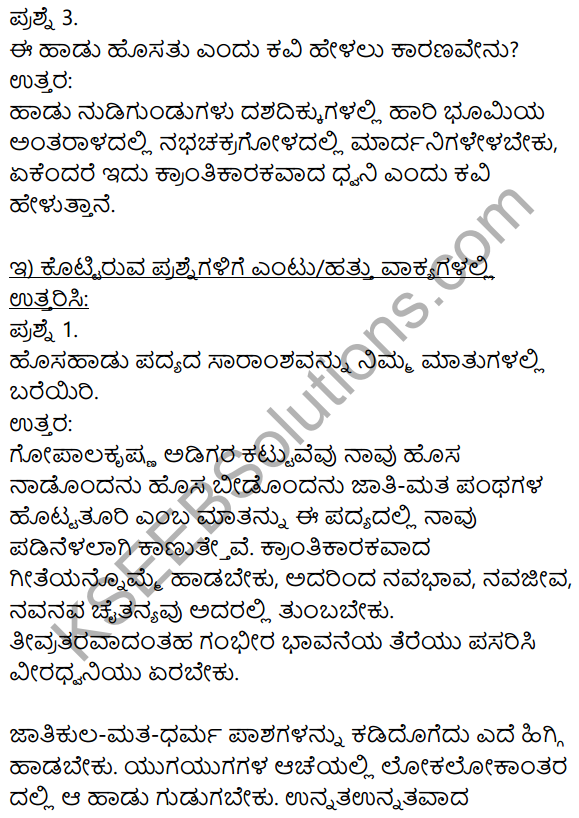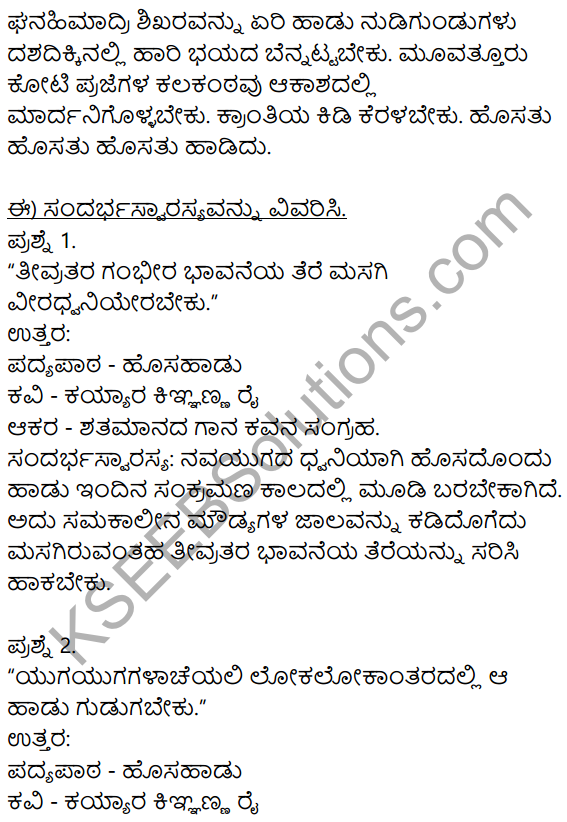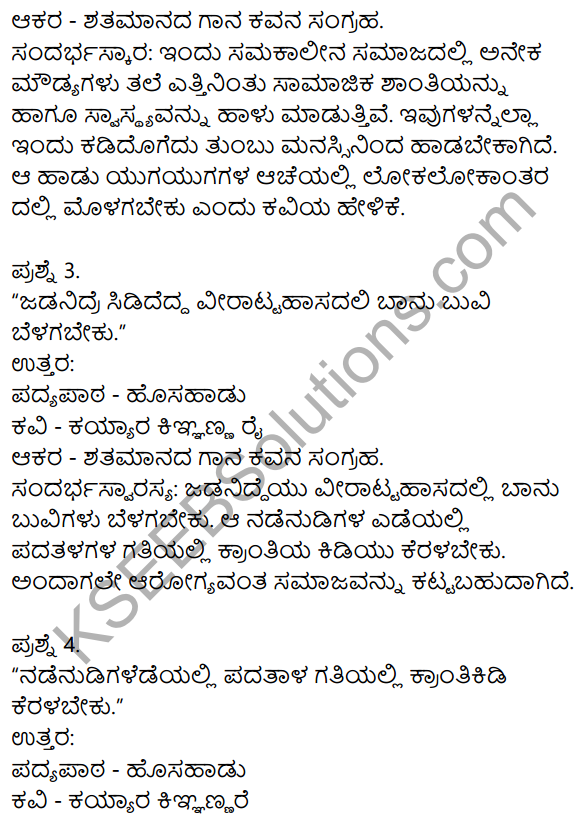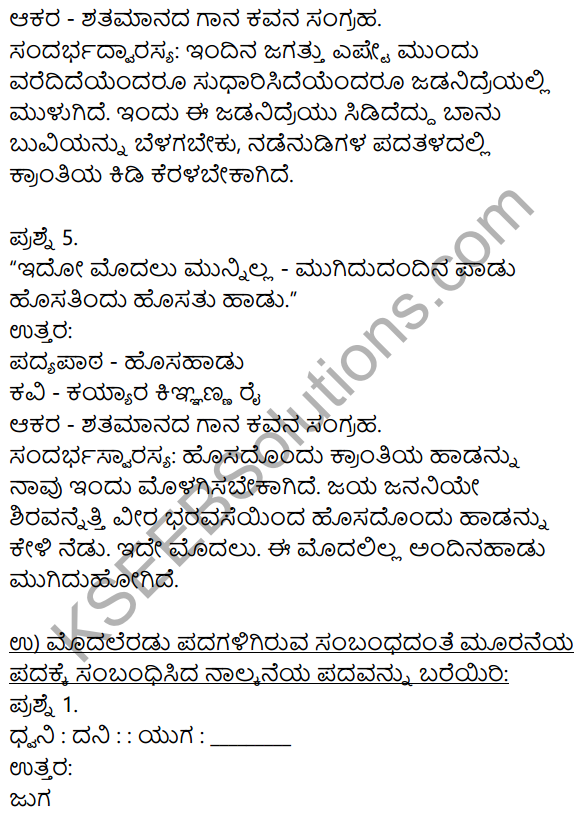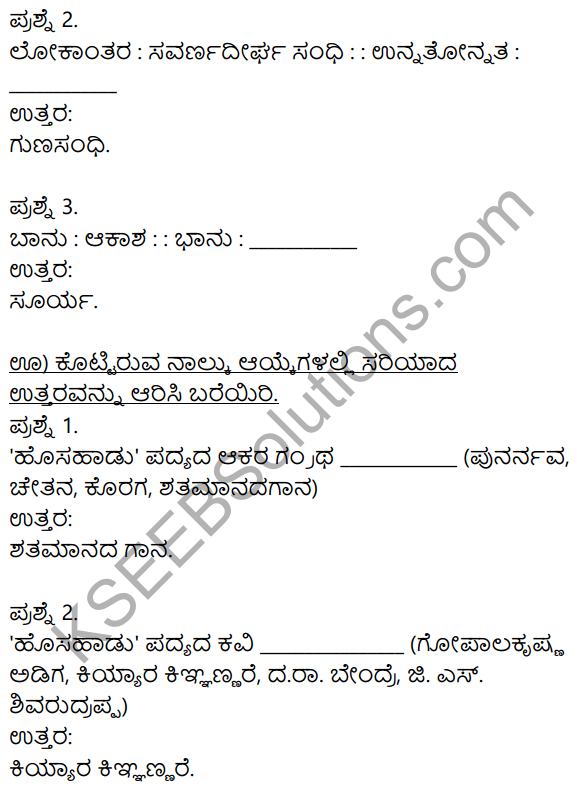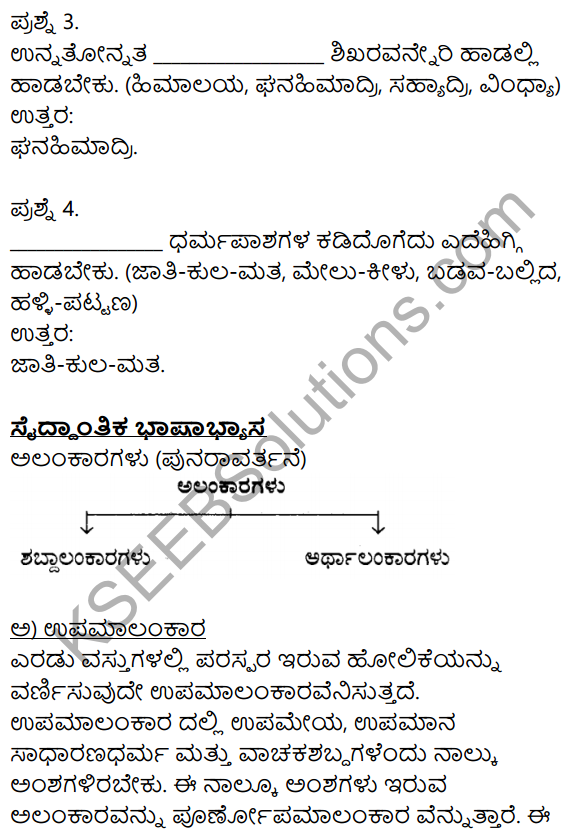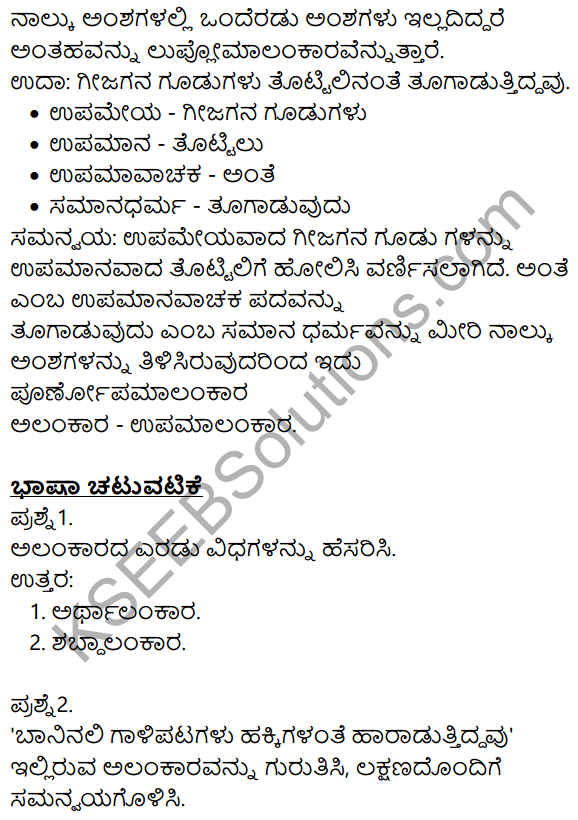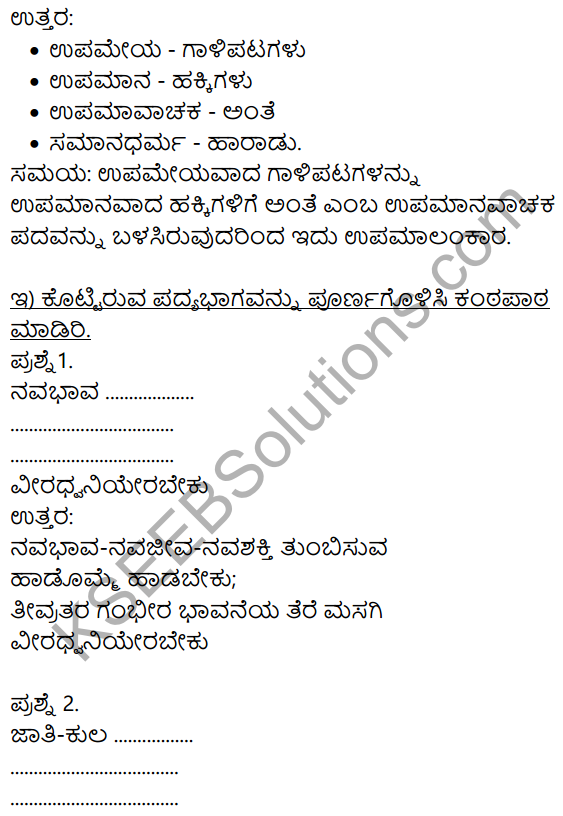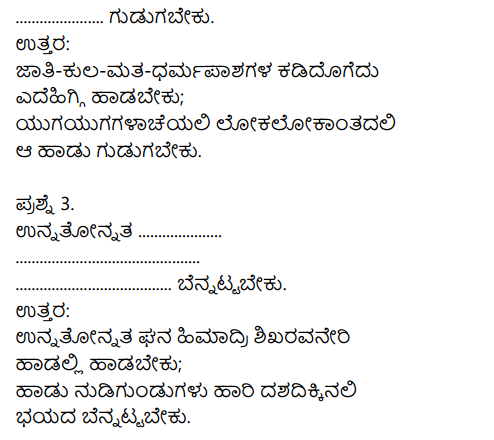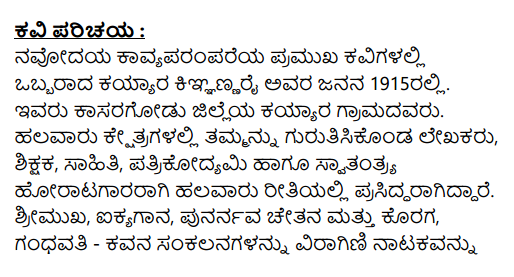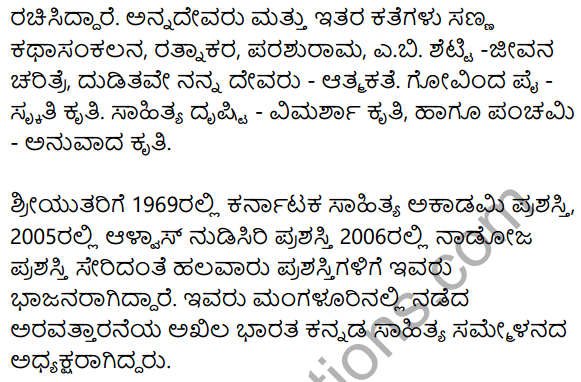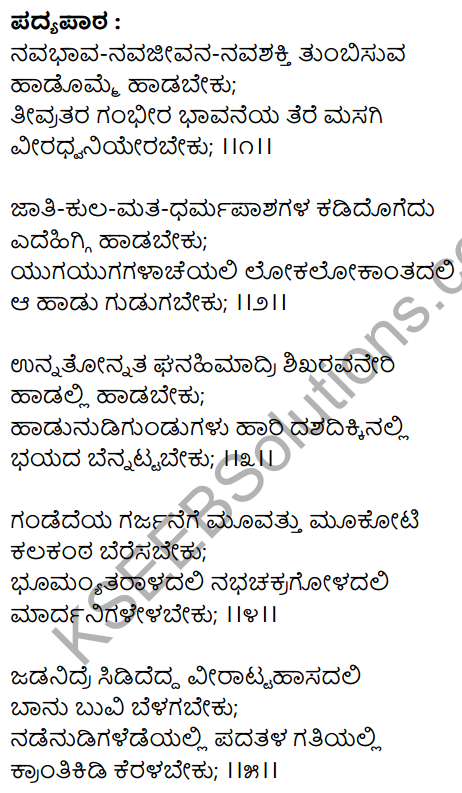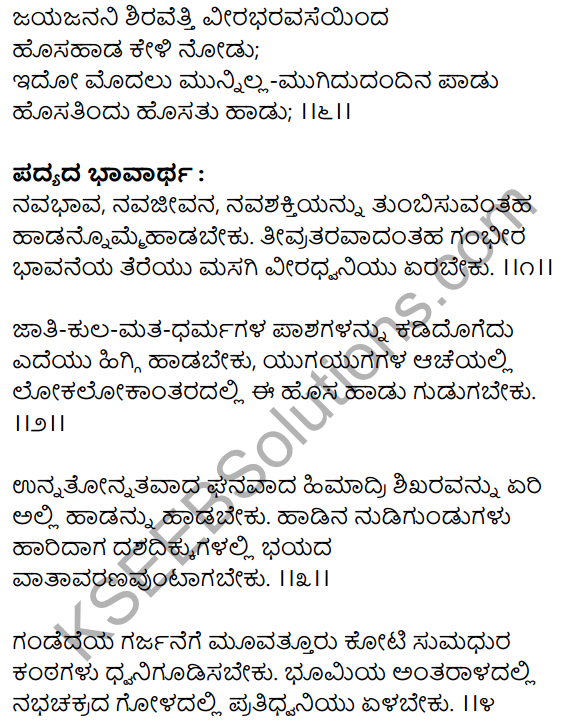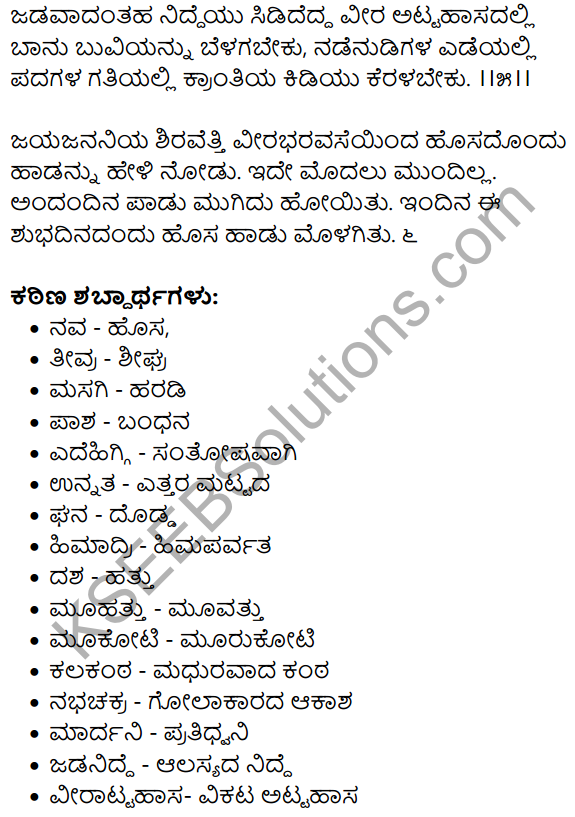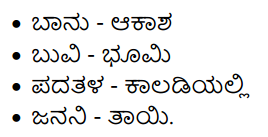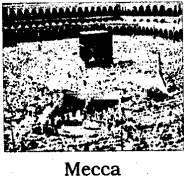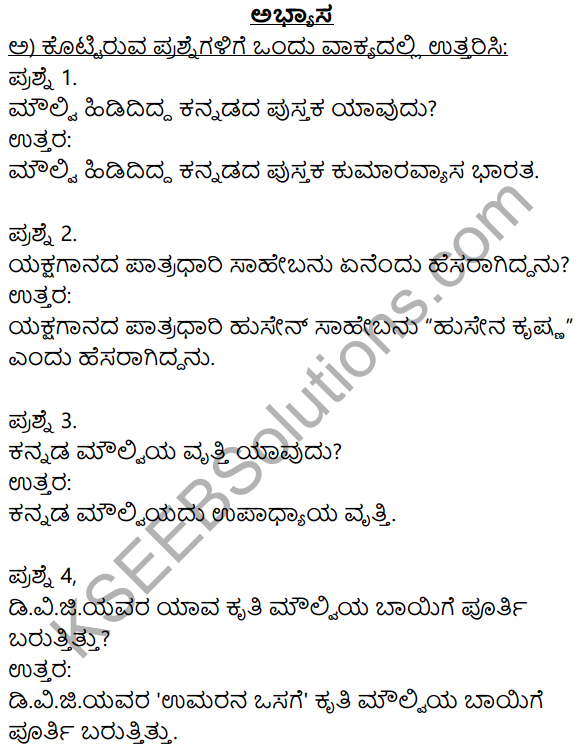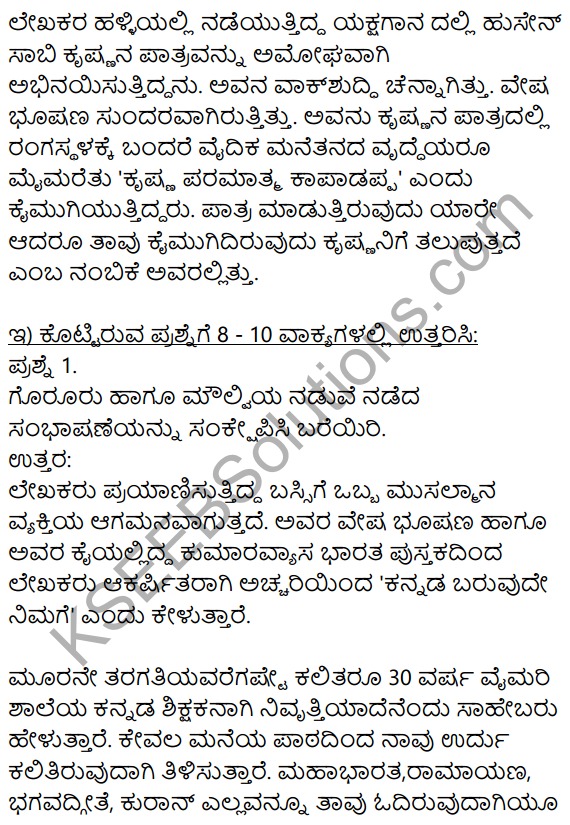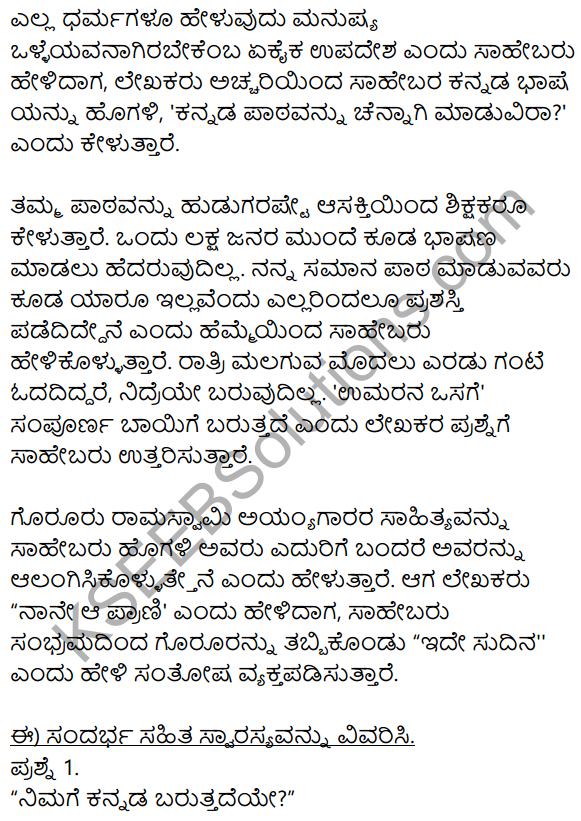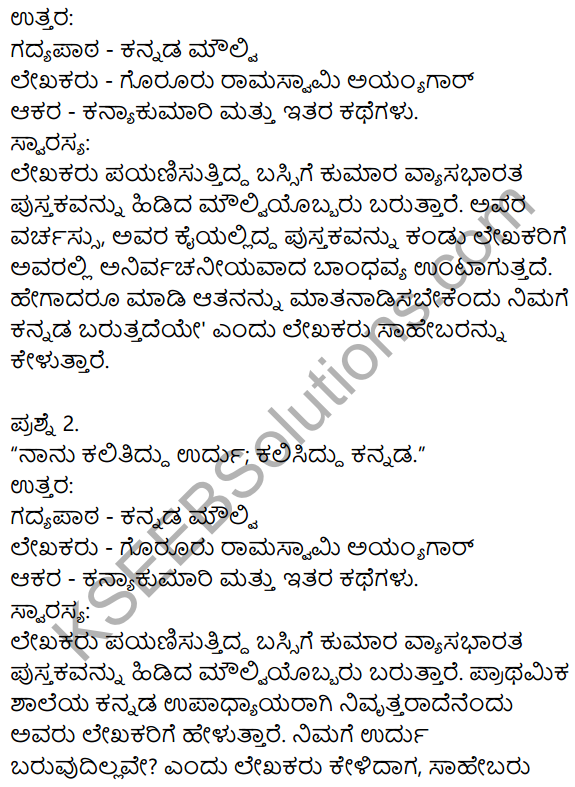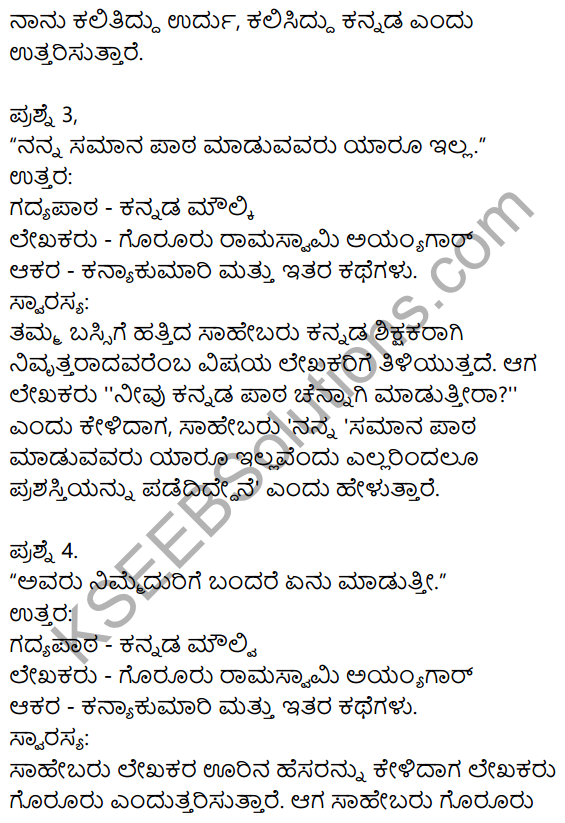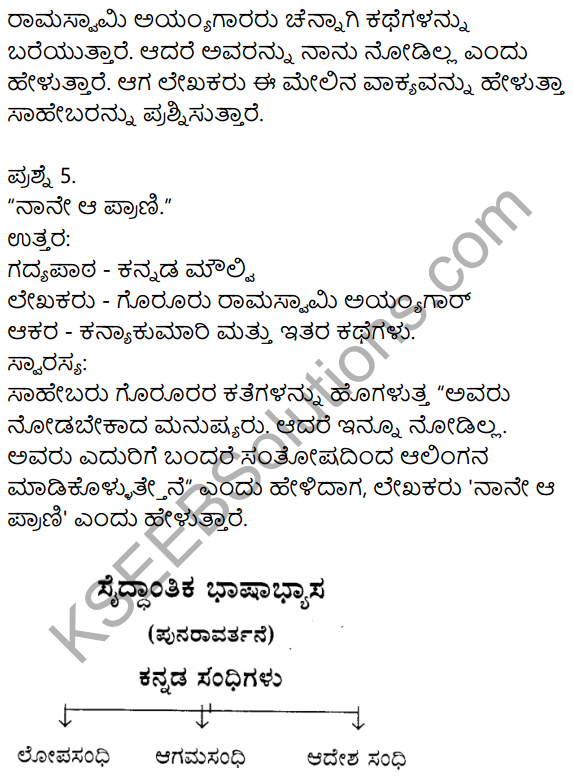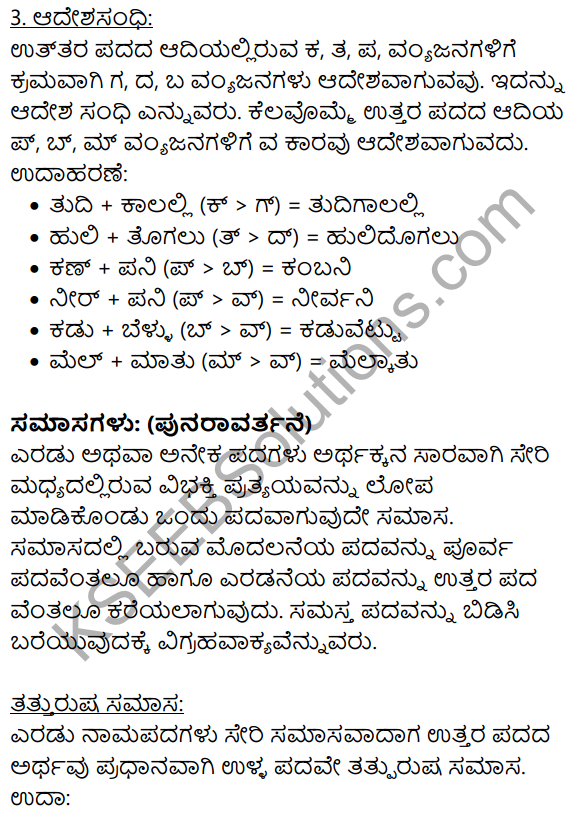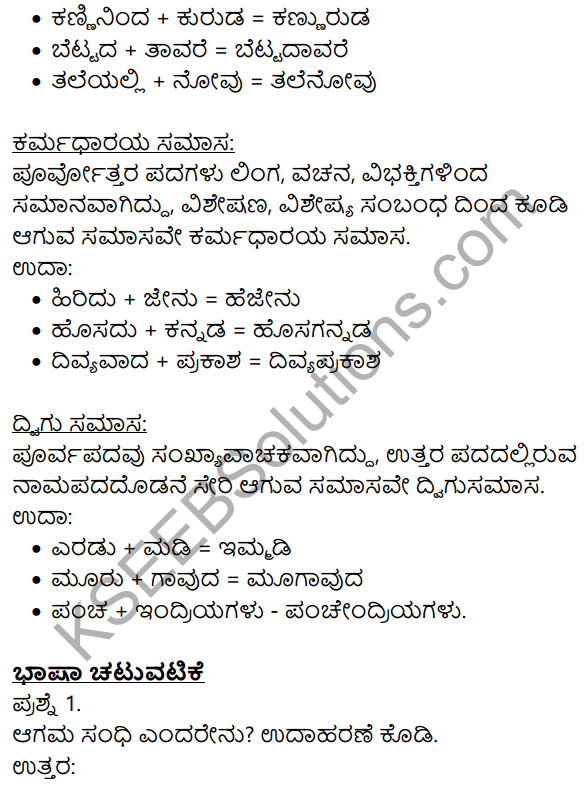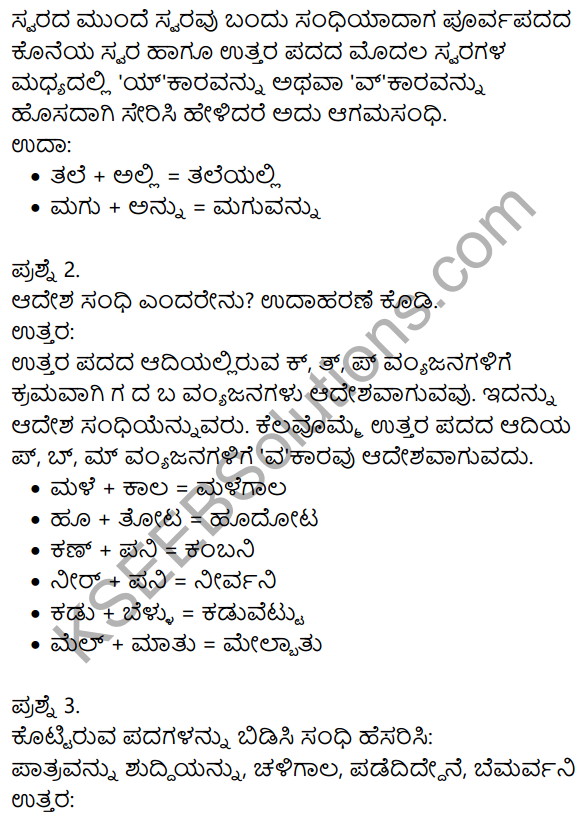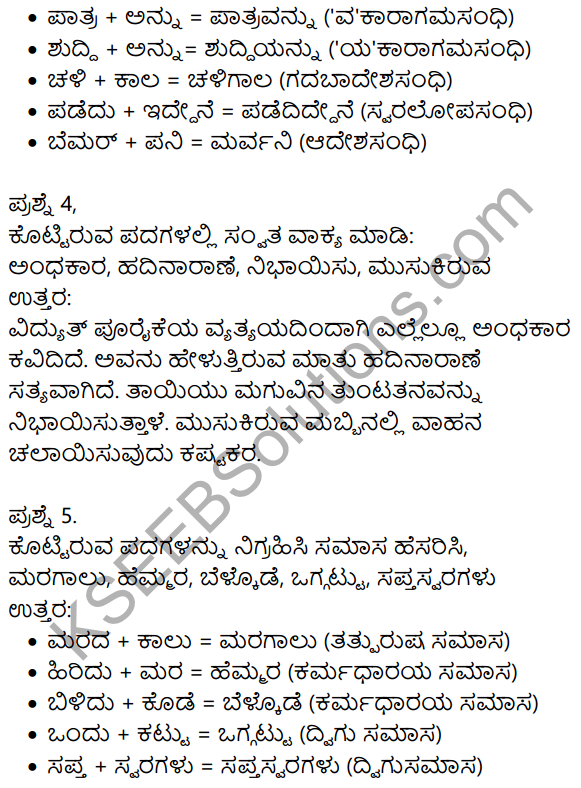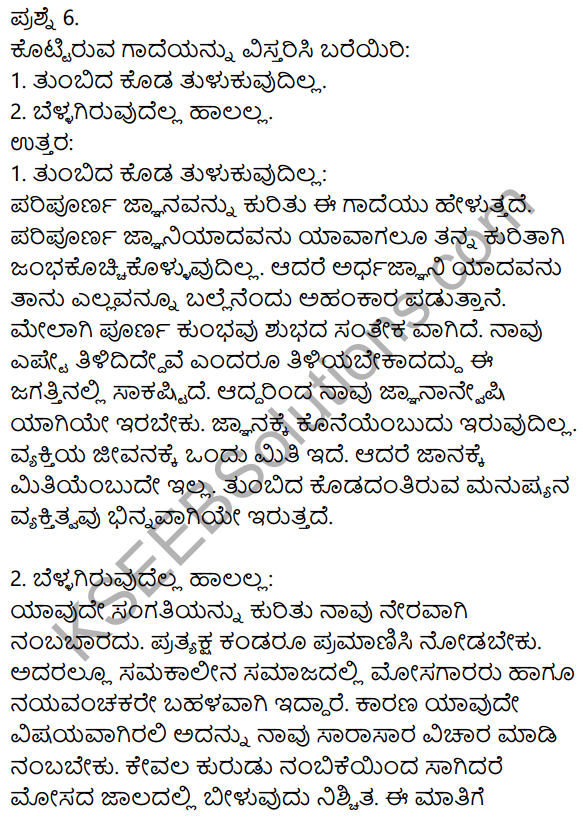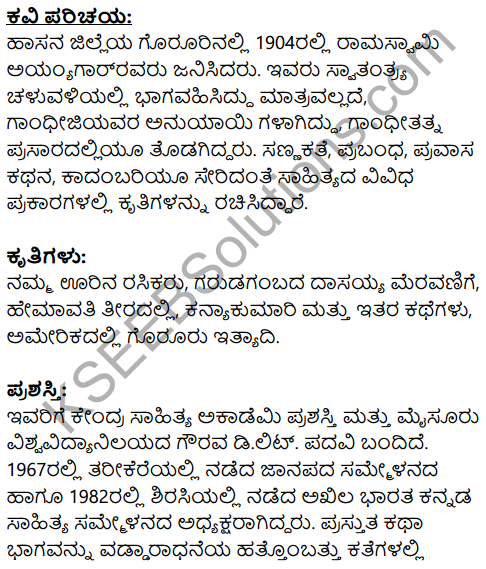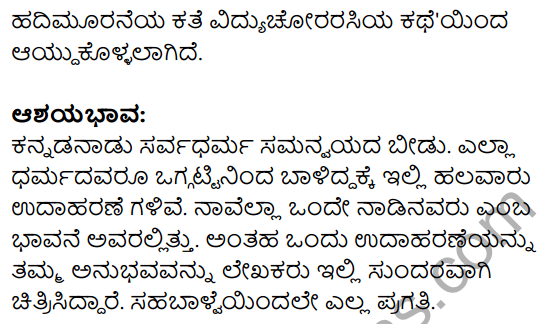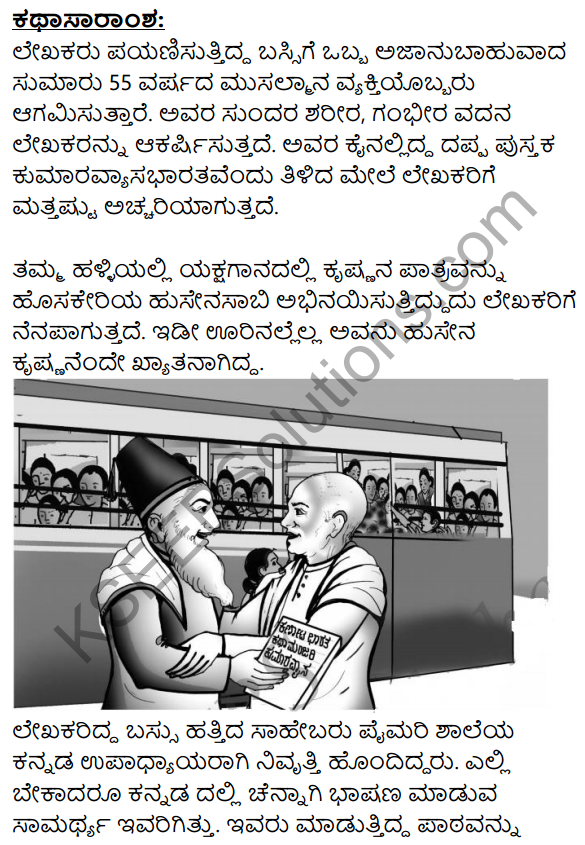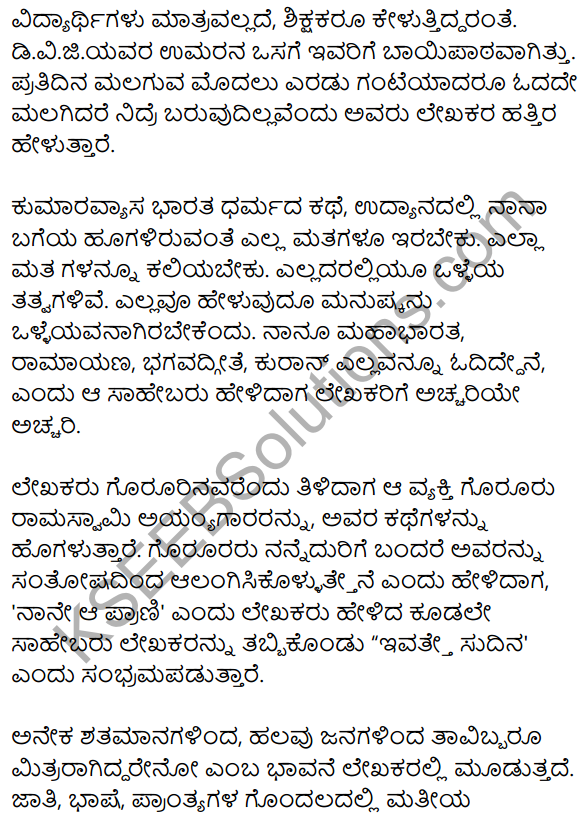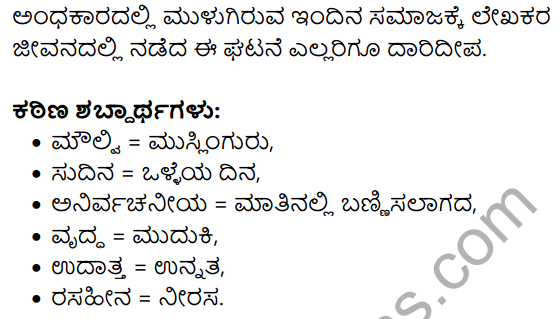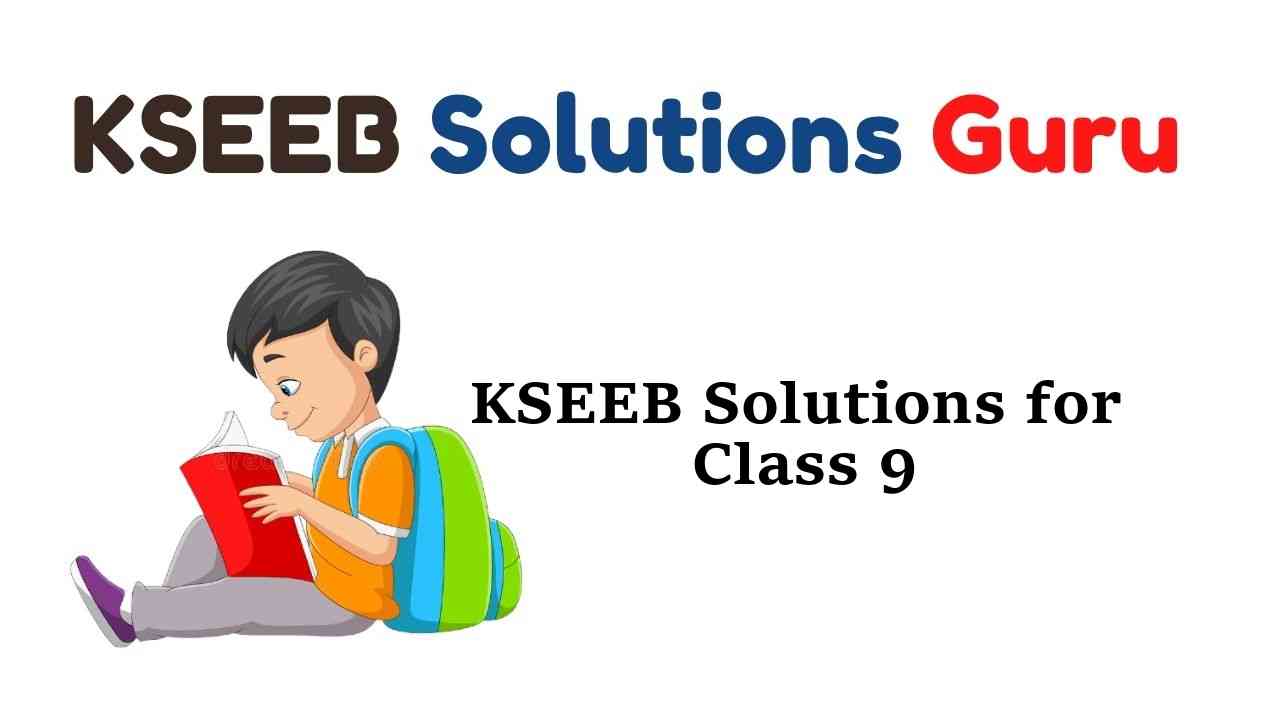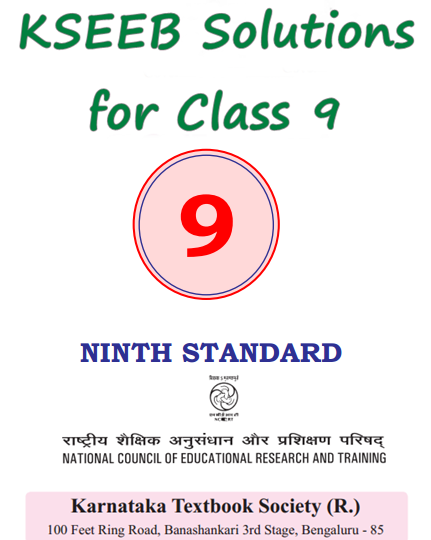By understanding the academic needs we have prepared the Karnataka State Board English Class 9 Solutions Chapter Wise. Our aim is to help the students by providing the question and answers chapter wise and help them to gain a good score in the exams. Before you start your preparation go through the chapters covered in this academic. So go through them and Download KSEEB Solutions for Class 9 English Prose Chapter 5 A Question of Space Question and Answers Pdf for free.
Karnataka State Board Class 9 English Prose Chapter 5 A Question of Space
The topics covered in Karnataka Secondary Education Examination Board Class 9 Solutions for English Chapter 5 A Question of Space. The KSEEB Solutions Class 9 English Solutions Chapter 5 A Question of Space Question and Answers are prepared according to the latest edition.The Chapterwise page will help the students to revise the syllabus during the exams.
A Question of Space Questions and Answers, Summary, Notes
Warm-Up Activity:
Work with your partner. The following ‘Word Search Puzzle’ has the names of different professions. Find them out. One (photographer) has been done for you.
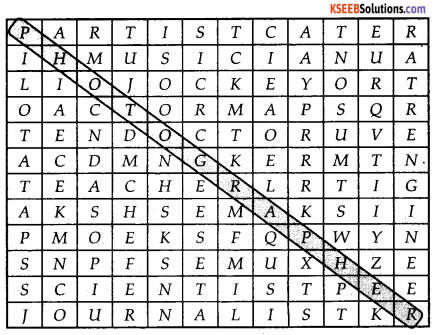
Answer:
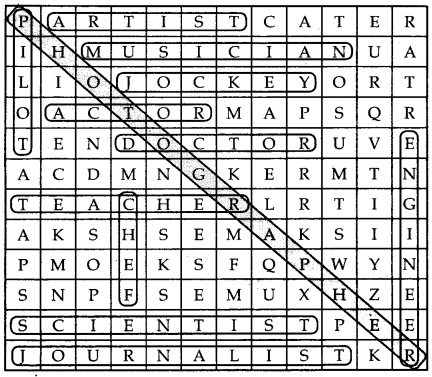
Comprehension:
C1. Read the lesson silently. The sequence of events in the lesson has been given below in a jumbled order. Rearrange them and write.
- Anuj had started journalism on his own and took up photography later.
- “It will help you witness your reactions as if they were happening to someone else”.
- He felt that he needed time to pursue his own interests and pleasures, especially after he met Anuj.
- The conflict had acquired a distinct edge ever since he had met Anuj.
- “If you still have not found out, when do you intend to enroll?”
- Anuj had turned into a friend very quickly, a much older friend.
- “It seems to me that the pressure is worse for children of doctors
- His class grades had dropped; he had started skipping group tuitions..
Answer:
- The conflict had acquired a distinct edge ever since he had met Anuj.
- Anuj had turned into a friend very quickly, a much older friend.
- His class grades had dropped; he had started skipping group tuitions.
- Anuj had started journalism on his own and took up photography later.
- “It seems to me that the pressure is worse for children of doctors”.
- “It will help you witness your reactions as if they were happening to someone else”.
- “If you still have not found out, when do you intend to enroll?”
- He felt that he needed time to pursue his own interests and pleasures, especially after he met Anuj.
C2. The extract given in the second column tells us about the persons mentioned in the first column. Write your response in the third column.
| Person | Extract from the story | What this tells us about them. |
| Vikrant | I am already full up with tuitions. | He is finding it difficult to cope with the pressure of his studies. |
| Vikrant’s
father |
It would be better if you turned your attention to investigating a coaching center rather than spend time with junkies and irrelevant things. | |
| Vikrant’s mother |
Mother was harping on the importance of the year for getting a good grip on science and maths | |
| Anuj | If you want to get control over a situation, you could start by observing your body’s reaction. |
Answer:
| Person | Extract from the story | What this tells us about them. |
| Vikrant | I am already full up with tuitions | He is finding it difficult to cope with the pressure of his studies. |
| Vikrant’s father | It would be better if you turned your attention to investigating a coaching center rather than spend time with junkies and irrelevant things. | Vikrant’s father is annoyed with him because Vikrant is hanging around with Anuj and is showing more interest in photography. Vikrant’s father feels that this is the outcome of Vikrant’s association with Anuj and he refers contemptuously to Anuj as a junkie who distracts Vikrant with irrelevant things. |
| Vikrant’s mother | Mother was harping on the importance of the year for getting a good grip on science and maths | The word ‘harping’ shows that the mother had the habit of nagging. She does not understand the passion of her son for photography. Instead of encouraging him in the area of his interest, she wants him to pursue what she and her husband are interested in. Just because they are doctors, she wants their son also to become a doctor. |
| Anuj | If you want to get control over a situation, you could start by observing your body’s reaction. | Anuj wants to help Vikrant. He knows that Vikrant is in a difficult situation as his and his parents’ interests are at loggerheads. Anuj knows that it is pointless to confront people and that confrontation only leads to unpleasantness. He knows that. it is reconciliation that would be beneficial. That is why he wants Vikrant to keep his emotions under control. Anuj knows that Vikrant would have great selfcontrol if he studied his own feelings and his body’s response to the same. |
C3. Answer the following questions in three or four sentences each:
Question 1.
Vikrant’s mother was harping on the importance of the year. Why was she anxious about Vikrant?
Answer:
Vikrant’s mother was talking about class XI as a good foundation for class XII. She knew that class XII would be a decisive year as it would show whether Vikrant had the scope to get admitted in a good institution for medical studies. Vikrant’s mother was anxious that Vikrant should ready himself to cope with the intensely competitive environment that had to be scaled for getting admission to a prestigious medical college. She showed her concern to mould the career of her son.
![]()
Question 2.
Anuj had spun into Vikrant’s life like a ‘new universe’. Why did Vikrant feel so? Who was Anuj?
Answer:
Anuj was a newfound friend of Vikrant. Though much older, he could understand Vikrant’s problems and be of help, Anuj was not just a person with dynamic ideas on photography; he could also throw light on the connectedness between human beings and all other living species. He gave new ideas to Vikrant for self-analysis – particularly the body language of the self and how to control expressions and feelings.
Question 3.
‘The identity ofVikrantzvithAmij created tension between Vikrant and his parents’. How did it happen?
Answer:
As an only child, Vikrant was the apple of his parents’ eye and they had all their hopes pinned on him. Being doctors, they hoped that Vikrant too would become a doctor. When Vikrant’s class grades dropped and he began skipping group tuitions and even extra school classes designed for the weekends, naturally his parents were upset. Tension grew between Vikrant and his parents over his identity with Anuj because they thought that it was Anuj’s bad influence that made Vikrant neglect his studies.
Question 4.
Vikrant said, “Medicine is considered …………… gives prestige”. Is this thought prejudicial? Do you agree with this opinion?
Answer:
Medicine is considered the noblest of all professions because it is in this profession that human beings save the life of other human beings. In other words, they are godly in their role as healers. Since it is considered a noble profession, it is considered prestigious also. There is nothing wrong in this line of thought. However, there are two points that go contrary to the idea. The first one is that not all doctors are noble. There are quite a few doctors who have refrained from saving lives just because their demands are not met. Secondly, it is not true that the other professions are not noble. Each profession has its own importance.
Question 5.
What was the reply of Anuj when Vikrant asked him how his suggestions would help him?
Answer:
When Vikrant asked Anuj how his suggestions would help him, Anuj replied that it would help him to witness his reactions as if they were happening to someone else. While observing his body and its reactions, he also had to distance himself from them. This distance would help him to observe his reactions and also control them by growing aware of them. This whole process can be termed as responding and not reacting to a situation. When you respond in a calculative manner without reacting instantaneously, you are being proactive and not reactive. This would be beneficial for all.
Question 6.
When did Vikrant start his self-observation? What did he observe? (Refer paras 23-25)
Answer:
Vikrant started his self-observation when he was in a conversation with his father. Once when Vikrant was having a talk with his father, he noticed that his mouth was dry, his head tight at the temples and his body slightly hunched. Vikrant noticed that his father’s last remark sent a strong wave of heat through his otherwise weary body, galvanizing him to leave the room without another word.
![]()
Question 7.
How did Vikrant’s father try to convince him to join tuitions for medical entrance?
Answer:
According to Vikrant’s father, tuitions for medical entrance were not just tuition. They coached him for a career, for a highly competitive exam. One wrong answer could make all the difference. It would be better if he turned his attention to investigating a coaching centre, rather than spend time with junkies and irrelevant things.
Question 8.
What are the last two steps of self-observation suggested by Anuj to Vikrant?
Answer:
Anuj suggested two last steps of self-observation to Vikrant. In the first one, the moment an active feeling comes, if it should be controlled, Vikrant should make a note of it without expressing it. In the second one, the person should express an emotion opposite to what one actually feels. If one is agitated, the minute one observes that the body language exhibits the agitation, one should consciously choose to express calm or warmth instead of coldness. In fact, the method of observing our own body language ensures that we don’t react immediately, but take time to respond maturely.
Question 9.
‘He did this with an awareness that it was the right thing for him to do.’ What does ‘awareness’ refer to here?
Answer:
‘Awareness’ refers to understanding. Vikrant who had all along resisted his parents’ desire that he enrol in a coaching class as a preparation for medicine, had the awareness that just as they had encouraged him in his interest, he should abide by their interest. So, Vikrant enrolled for classes at a coaching center for a medical entrance test. This he did with awareness about his future career. He was capable of deciding for himself. He could analyze his interests and come to a conclusion about what he had to do for his prosperity.
Question 10.
The word ‘Space’ in the title of the lesson has a significant reference. Comment on the title.
Answer:
Space in the title of this lesson has a significant role to play. It does not refer to physical space. It is a metaphoric reference to individual choice and freedom. It refers to that room or opportunity for one’s own interests. Generally, the interests and ideas of parents, friends and society are imposed on the children who are in the growing stage.
C4. Read the following extracts from the lesson carefully and explain each of them with reference to the context:
Question 1.
“Hey! What’s up? You look grim”.
Answer:
This sentence is taken from the lesson ‘A Question of Space’ by Neera Kashyap. The sentence is uttered by Anuj near the jogging track. Anuj puts this question to Vikrant as he looks quite dull and depressed, after being rebuked by his parents about his decreasing academic performance. Vikrant is like a bird in the cage which wishes to be free in the blue sky. But he feels trapped. Seeing his condition, Anuj asks the question above.
Question 2.
“But tell me, how do you react to pressure?”
Answer:
This sentence is an extract from the lesson ‘A Question of Space’ by Neera Kashyap. When Vikrant asks Anuj if his parents put pressure on him to become a photojournalist, Anuj answers in the negative. Vikrant feels that the pressure is worse for the children of doctors because medicine is considered the noblest among all professions and therefore gets prestige. So he asks Anuj how he reacts to such pressure.
![]()
Question 3.
“Sure. . . Why not? Actually, our range of expression is quite limited”.
Answer:
This sentence is selected from the lesson ‘A Question of Space’ by Neera Kashyap. This is said by Anuj to Vikrant. When Vikrant wants to clarify whether it is necessary to observe the body when one feels happy or excited or adventurous, and not necessarily only when one is under pressure, Anuj replies thus. Anuj continues that when one gets his full range of emotions, he will become aware of all his habitual expressions.
Question 4.
“If you still have not found out, when do you intend to enroll?”
Answer:
The sentence above is chosen from the lesson ‘A Question of Space’ by Neera Kashyap. When Vikrant’s father asks whether he has found out which is the most suitable coaching centre for his medical entrance test, Vikrant replies in the negative. At that point, Vikrant’s father reacts in this manner.
The reaction shows his annoyance with Vikrant.
Question 5.
“You cannot really change anything till things are ready for change”.
Answer:
This sentence is taken from the lesson ‘A Question of Space’ by Neera Kashyap. These are the wise words of advice of Anuj to Vikrant. Anuj notices one evening that Vikrant has a sense of discouragement because he is not able to make his parents see his viewpoint. So Anuj advises him not to be unduly perturbed over things which are beyond his area of control. Anuj wants Vikrant to take things as they come without losing his composure. However, Vikrant, who does not have the maturity of Anuj, is not able to understand the import of the words of Anuj.
C5. Answer the following questions:
Question 1.
Compare and contrast the characters – Vikrant and Anuj. Who would you like to be – Vikrant or Anuj? Justify your answer.
Answer:
Vikrant and Anuj build a rapport despite the difference in age. The only similarity between them is that both of them are from reputed families. Vikrant is a student of class XI whereas Anuj is a grown-up person, working as a photojournalist. Anuj acts as the confidante of Vikrant when Vikrant is getting worried and depressed over his parents’ pressure all the time to study more for the Class XII examination and medical entrance examination.
When Vikrant is in this state of being pressurised by his parents, he comes to know that Anuj has chosen to study photography as per his liking. He is even more surprised to know that Anuj’s parents have no objection to his pursuing his interests. It is at this point that Anuj helps Vikrant to analyze his own feelings and expressions to handle the pressure. Vikrant gets influenced by Anuj’s guidance and experience.
Thus we see that of the two, Anuj is more mature and is in a position to guide Vikrant. His advice to Vikrant on controlling his emotions shows that he is mature in his outlook and attitude. Hence it would be the desire of everyone to be like Anuj.
![]()
Question 2.
After Vikrant follows Anuj’s advice, we observe a change in his attitude and behaviour. Trace the chain of these changes.
Answer:
Once Vikrant develops a friendship with Anuj, he confides in him about the pressure from his parents. Vikrant
also tells Anuj about being disturbed by this. At that juncture, Anuj advises Vikrant on self-observation. He tells Vikrant to start observing his body whenever he feels a strong emotion. As per the advice of Anuj, Vikrant starts noticing his own body’s behavioural changes. After this self-observation, Vikrant realises that conflicts are not getting him anywhere. He also realises that he is not totally averse to the idea of studying medicine.
It is only that he does not want to be bulldozed into working three shifts a day, six days a week. He needs time to pursue his own interests and pleasures. After this stage, Vikrant tries to practise emotions which he has not experienced, yet is able to simulate. At first these are positive emotions of joy, spontaneity and excitement. When he feels more neutral, he practises a wider range. His experiments with self-observation help him see a whole range of his body reactions and the effects that different emotions have on the body and how the mind gets involved with these.
Question 3.
What is the role played by Anuj in this lesson? What message does the author convey to the reader through his character?
Answer:
Anuj is a true friend who helps Vikrant in need. We see that though Anuj has nothing to gain, he spends a lot of time to advise Vikrant and to solve his problems. After meeting Anuj, Vikrant feels he needs time to pursue his own interests and pleasures. We see that Anuj plays the role of a counselor guiding Vikrant. It is appreciable that he does not speak a single word against Vikrant’s parents.
The only piece of advice he gives Vikrant is to be aware of his emotions and to control them. He also speaks to him on various issues like his hobby of photography and self-observation. He also advises Vikrant not to worry too much about the change as no one can really change anything till things are ready for change. Thus, the author says that a positive approach to things or events can alter situations. Self-observation helps one to control one’s own feelings and expressions.
Question 4.
Assume yourself to be Vikrant. Write a letter to a friend discussing the ways in which you transformed yourself.
Answer:
Hi Susheel,
How have you been? I’m sure that you are surprised by this unexpected letter from me. I know that ours is the age of WhatsApp. But I have decided to take recourse to the older method of snail-mail because I want to share with you something dear to my heart.
I remember telling you a couple of months ago that I was upset with my parents for pressurizing me over my preparation for class XI exam and enrolment in a coaching center as preparation for the medical course. I was under a lot of stress because I felt my parents did not understand me and were forcing me to do, without giving me space, what I didn’t want to do. I didn’t like the idea of decisions about my future being unilaterally made by others. But there was a change in my viewpoint because of the timely intervention of one of my friends called Anuj.
Anuj is a photo-journalist and his unique ideas on a wide range of topics drew me to him. Though my parents didn’t like the idea of my spending a lot of time with him, it is because of him that my problems with my parents got resolved.
When Anuj realized that I was getting agitated over the conditions put by my parents over me, he taught me the technique of self-observation to control my emotions. He told me that it was important to note how our body reacts to emotions, both positive and negative, for self-awareness. Once we are aware of our physical behavior, we can control our mental thoughts.
This is possible because of the stage of distancing that takes place. When we start observing our physical responses, we distance ourselves from them. When we distance ourselves from our own behavior, we are more objective about ourselves and are able to control our thoughts. Moreover, when we control our negative physical behavior, we don’t displease people with whom we interact. But most importantly, we also realize that we ourselves could be in the wrong.
The same thing happened to me also. To begin with, when my mother made derogatory references to Anuj and my hanging out with him, as usual, I was angry. But once I started observing my physical reaction, I was able to control my agitation, retain my poise and speak calmly about what my association with Anuj meant to me. With this assertive but not arrogant behavior, I could convince my parents that they had to allow me to accommodate my interests even as I tried to do justice to my academic performance.
When my parents exhibited the spirit of accommodation, I too felt that their insistence on my pursuance of medical degree was not at all a bad idea. Thus, there was reconciliation between my parents and me and I can now say, ‘All is well that ends well.’ But all this was possible because of a level-headed, intelligent and empathetic person – Anuj.
When you come down next, let’s make it a point to meet him. I’m sure you will immensely enjoy his company. Do let me know when you plan to come down.
Warm regards
Vikrant
Question 5.
Do you have a dream/or a desire to do something? If yes, say how you would like to realize the same, in 10-15 sentences.
Answer:
Yes, like everyone else, I too have a dream. In fact, I have many dreams. But the most overpowering of them all is to be a winner in one of the reality shows. But alas! I am not especially gifted in any particular field of activity. I am neither a singer nor a dancer. It is true that I croon occasionally and tap my feet rhythmically. But it will not suffice to win an award. I cannot draw even straight lines; neither can I speak effectively.
Yet I want to be a winner. So I hope there will be a reality show for ordinary people like me, good at nothing; yet having the dream of winning. I hope to be a contestant in a reality show in which you get eliminated one by one because of your talent and the one with no talent at all wins. If there is a reality show of this kind, I will surely win and that is my dream!
Multiple Choice Questions:
Question 1.
Vikrant found himself completely out of breath
A) because he had jogged for 3.2 km
B) he had been thinking of his exams
C) his father had scolded him
D) his mother did not want him to go out.
Answer:
A) because he had jogged for 3.2 kms
Question 2.
Vikrant’s parents were
A) not interested in his studies
B) pressurising him to gear up for the medical entrance exams
C) forcing him to become a journalist
D) forcing him to become a photographer.
Answer:
B) pressurising him to gear up for the medical entrance exams
![]()
Question 3.
Vikrant’s class grades dropped because
A) he was studying hard
B) he developed new interests
C) he went astray
D) he was not interested in studies.
Answer:
B) he developed new interests
Question 4.
Doctors want their children to become doctors because
Answer:
A) it is easy to study medicine
B) the profession brings a lot of money
C) medicine is the noblest profession
D) it is easy to deal with patients.
Answer:
C) medicine is the noblest profession
Question 5.
Anuj wanted Vikrant to notice
A) his reactions as if they were happening to someone else
B) Anuj’s behaviour
C) the reactions of his parents
D) how his friends react in different circumstances.
Answer:
A) his reactions as if they were happening to someone else
Question 6.
Anuj advised Vikrant to
A) study hard
B) look for good coaching centres
C) practise expressions when there are no feelings
D) express what he feels
Answer:
C) practise expressions when there are no feelings
Question 7.
The last step suggested by Anuj to Vikrant was
A) to say no to his parents
B) to walk away
C) to express an emotion opposite to what he felt
D) to express an emotion as he felt it.
Answer:
C) to express an emotion opposite to what he felt
Question 8.
Finally, at the end of Class XI, Vikrant
A) stopped following Anuj’s advice
B) decided to stop studying
C) joined a coaching centre for medical entrance
D) decided to study engineering.
Answer:
C) joined a coaching centre for medical entrance
Question 9.
Anuj had turned into a photo-journalist because
A) his parents had pressurized him into it
B) this profession earned him a lot of money
C) he had a passion for it
D) he was not good at anything else.
Answer:
C) he had a passion for it
![]()
Question 10.
Anuj became a very good friend of Vikrant because
A) he was older
B) he also exercised with him
C) his dynamic ideas on photography and interest in self-improvement attracted Vikrant
D) he was very rich.
Answer:
C) his dynamic ideas on photography and interest in self-improvement attracted Vikrant
Question 11.
Tension grew between Vikrant and his parents because
A) Vikrant spent more time with Anuj
B) Vikrant’s interest in photography increased but his grades started dropping
C) Vikrant didn’t talk to them
D) Vikrant refused to study.
Answer:
B) Vikrant’s interest in photography increased but his grades started dropping
Question 12.
It is good to practice expressions when there are no feelings to be expressed because
A) it helps you to cheat others
B) one can experience the effect that different emotions have on the body
C) you can make others happy
D) one can become a good actor
Answer:
B) one can experience the effect that different emotions have on the body
Question 13.
Vikrant felt he could work hard towards a career if
A) he attended coaching classes soon after class XI
B) his parents let him pursue his new interests
C) he did not bother about coaching class and pursued only his interests
D) he had more time.
Answer:
B) his parents let him pursue his new interests
LANGUAGE ACTIVITIES:
A. VOCABULARY:
V1. Emotions
The nouns such as pleasure, spontaneity, excitement, etc., are used to express actions, emotions or feelings and the quality of actions. Pick out such words from the lesson which express emotions and put them under the following Columns.
| Pleasant | Unpleasant |
| e.g. glee | e.g. dejection |
Answer:
| Pleasant | Unpleasant |
| happy | anxious |
| excited ‘ | suspicion |
| adventurous | dismay |
| joy | hostility |
| spontaneity | scorn |
| warmth | discouragement |
| calm | coldness |
| satisfaction | agitated |
| glee | hopeless |
| pleasure | tension |
| excitement | pressure |
| worry | |
| dejection | |
| confrontation |
V2. Match the words in column ‘A’ with the corresponding meanings given in column ‘B’. You can use a dictionary to verify your answers.
| A | B |
| 1) Stevedore | a) one who studies rocks and soils |
| 2) Chauffeur | b) one who loads and unloads ships |
| 3) Geologist | c) one zoho drives a car for someone else |
| 4) Juggler | d) one who is in charge of a museum |
| 5) Anthropologist | e) one who performs tricks with the hands to amuse others |
| 6) Auditor | f) one who studies human development |
| 7) Curator | g) one who examines the financial records of a company. |
Answer:
- b
- c
- a
- e
- f
- g
- d
V3. Phrasal Verbs:
A) Complete the following sentences with a phrasal verb that includes one of the particles and one of the verbs given below.
Particles: down, in, out, up
Verbs: turn, come, slow, let, go, drop, grow, warm, plug, pull.
Eg. a) Please _______ for a cup of coffee whenever you are passing by.
Answer:
drop, in
b) Would you ______ the television _______ , please. It’s very loud.
Answer:
turn, down
- The dentist says John will have to ______ two teeth ______.
- Videos are cheaper now. Prices have actually ______ ______ since the 1980’s.
- He could play the guitar when he was six. I think he’s going to be a great musician when he _____ _____.
- ___ ____! You are driving much too fast!
- Smoking is not allowed in here. Please _____ _____ that cigarette.
- You must be very cold. Sit by the fire and _____ _____
- There’s someone at the door. Can you _____ them ______ please?
- Look, there’s the plug on the floor. You haven’t _____ the television ______.
Answer:
- pluck; out
- come down
- grows up
- Slow down
- put; out
- warm-up
- let; in
- plugged; in
![]()
B) Find the meanings of the following phrasal verbs and use them in sentences of your own:
Come across, get on, take part, getaway, get through, keep out, think over, take down, look into.
- Come across: find by chance
Ramesh came across his old classmate at the bus stop. - Get on: be friendly
Indians get on very well with total strangers. - Take part: participate
Students should have the interest to take part in extra-curricular activities. - Getaway: manage to escape
Nobody can get away with wrongdoing. - Get through: pass
It is very difficult to get through the CA examination. - Keep out: stay away
Tell the children to keep out of mischief! - Think over: consider, judge, weigh the pros and cons
You should think over the prospects of starting a new business venture in Mangalore. - Takedown: write
The boss was so fast that the stenographer could not take down all the points. - Look into: investigate
Only after the women’s organizations condemned the incident, the Minister ordered the police to look into the case.
C) Match the meanings of the phrasal verbs in column A with their meanings in column B.

Answer:

B. GRAMMAR AND USAGE:
COMPARISON
G1. Comment on the information using a comparative and superlative adjective.
- Venus has a diameter of 12,104 kilometers. It isn’t as big as the Earth, which has a diameter of 12,756 kilometers. The earth is ………………. bigger than Venus.
- The Mona Lisa is worth many millions of dollars. No other picture in the world is so valuable. The Mona Lisa is ……………. the most valuable picture in the world.
- Telecom Tower is 180 meters tall, but Canada Tower in East London is 250 metres tall. The Canada Tower is …………… taller than the Telecom Tower.
- Cambridge University dates from 1284, but it is not as old as Oxford University, which dates from 1167. Oxford University is …………………. older than Cambridge University.
- Toby, who lived in New York, was a much-loved dog. When his owner died, she left $ 75 million, which made him a world record
breaker among wealthy dogs. Toby was ………………… the wealthiest dog in the world when his owner died.
G2. A)The chart below shows the information on the expenses incurred in conducting the Annual Sports Meet in a school. Study the chart carefully.

The total cost estimated for the Annual Meet is Rs. 90,500.
- No. of events : 70 (50 Track and Field events and
20 Throws and Jumps) - No. of athletes : 750 (450 Girls + 300 Boys)
- Staff on duty : Teachers – 65 (25 men + 40 women),
Support Staff 20 (10 men + 10 women), Staff on Parking and Security duty 15 ‘ (10 men + 5 women) - Medals: 70 Gold, 70 Silver, 70 Bronze
- Best Athlete Trophies : Boys 3, Girls 3
- Best House Trophies : 4 (1 for each category and 1 overall)
Assume you are the Sports Secretary in charge of the School Annual Sports Meet. Taking information from the chart, prepare an oral presentation for the Management Committee of the school. Use as many expressions of comparison as you can.
Answer:
The Annual Sports Day of KVG School was carried out with pomp and glory. The expenses show that the least amount was spent on invitations, souvenir, and certificates as it came up to only 5% of the total expenditure. The biggest amount coming up to 30% was spent on the cultural programme. The amount spent on mementos and trophies at 15% was more than the amount spent on the tent, chairs, and decoration which was at 10%. The expenditure on refreshments was as much as that of mementos and trophies but was less than that of sports equipment, the expense of which stood at 25%.
There were 70 events on the whole, and the track events were more than the field events. Among the athletes, girls numbering up to 450 were more than boys who were only 300. Even among the staff on duty, there were more women than men, the ratio being 40:25. However, the support staff who were 20, had 10 men and 10 women. Gold, Silver and Bronze medals, 70 each, were bagged by the 750 athletes. Three boys and three girls were awarded the Best Athlete Trophies. Four Best House Trophies, one in each category, and one Overall Trophy were also presented.
B) Read the following article in which the writer compares the treatment of boys and girls.
Complete the article by filling in the spaces with appropriate words from the box given below.
![]()
For many parents, especially those who are poor and illiterate, a girl is a ‘lesser child’. Doesn’t it make you mad to know that girls aren’t given an equal chance to be born? Though female infanticide was banned by law over a century ago, thousands of . girls are killed before they are born or when they are babies.
Even the girls who are allowed to survive live with less of everything …………… girls are sent to school ………….. boys. They get ……………. medical care, so …………. girls die. Boys get …………… nutritious food and also …………… time to play …………….. jobs are open to girls, and even if they are employed, they are not paid as ……………. as boys. Most of all, they get ……………. respect. They are not given as ……………… opportunities as the boys to speak out on
matters that concern them. And yet, a girl usually does twice as ………….. work ……………. a boy, not only in the house but also in the fields.
This discrimination and bias must end, and end now! Can we count on your support?
For many parents, especially those who are poor and illiterate, a girl is a ‘lesser child’. Doesn’t it make you mad to know that girls aren’t given an equal chance to be bom? Though female infanticide was banned by law over a century ago, thousands of girls are killed before they are bom or when they are babies.
Even the girls who are allowed to survive live with less of everything. Fewer girls are sent to school than boys. They get less medical care, so many girls die. Boys get much nutritious food and also much time to play. Few jobs are open to girls, and even if they are employed, they are not paid as much as boys. Most of all, they get less respect. They are not given as many opportunities as the boys to speak out on matters that concern them. And yet, a girl usually does twice as much work as a boy, not only in the house but also in the fields.
This discrimination and bias must end, and end now! Can we count on your support?
C) Read the information and complete the sentences using more, most, less, least, fewer, or fewest.
- There isn’t as much crime in the country areas as there is in cities. There’s ………….. than in the cities.
There’s less crime in the country areas than in the cities. - No other state of the U.S. has as much rain as Louisiana. Louisiana …………. rain.
Louisiana in the U.S. has the most rain. - The Green Party candidate didn’t get many votes. All the other candidates got more. The Green Party candidate ………….. votes.
The Green Party candidate got the least votes. - There are lots of passengers on the buses in the daytime, but not so many in the evenings. In the evenings ………….. on the buses.
In the evenings there are lesser passengers on the buses. - At the moment Arsenal has 42 points. No other club has more than 37. Arsenal points.
Arsenal has the most points. - Seiko has made very little profit. In fact it has made less than any other supermarket. Seiko …………. profit.
Sellco has made the least profit. - The accident rate among young drivers is higher than among older drivers. Young drivers …………… than older drivers.
Young drivers have more accident rate than older drivers.
D) Complete the conversation. Put in less, least, more, most, or as.
- Lobo: I’m going to Delhi next week, so I’ll have to book my flight.
I think it’ll be more convenient to go by air than by train. - Peter: I’d go by train. Trains are comfortable than planes.
- Lobo: But the train fare is really expensive. The plane isn’t …………… expensive as the train, which always surprises me.
- Peter: I hate flying. It’s my …………… favourite means of transport.
- Lobo: Well, I don’t mind it. And I’m not keen on trains as you are. A short flight is …………….. boring than a long train journey, I find.
- Peter: I’d rather drive than fly.
- Lobo: I’m definitely not driving. No, thank you. Driving all the way would be the …………… stressful way of getting there.
- Peter: I don’t think driving is ……………. stressful as flying.
- Lobo: Well, it is to me.
- Peter: And will you be able to get a flight at the right time? Planes are …………… frequent than trains, aren’t they?
- Lobo: Oh, there are plenty of flights. There’s one at ten in the morning. That’ll be the …………….. convenient.
Answer:
- Lobo: I’m going to Delhi next week, so I’ll have to book my flight. I think it’ll be more convenient to go by air than by train.
- Peter: I’d go by train. Trains are more comfortable than planes.
- Lobo: But the train fare is really expensive. The plane isn’t as expensive as the train, which always surprises me.
- Peter: I hate flying. It’s my least favorite means of transport.
- Lobo: Well, I don’t mind it. And I’m not as keen on trains as you are. A short flight is less boring than a long train journey, I find.
- Peter: I’d rather drive than fly.
- Lobo: I’m definitely not driving. No, thank you. Driving all the way would be the most stressful way of getting there.
- Peter: I don’t think driving is as stressful as flying.
- Lobo: Well, it is to me.
- Peter: And will you be able to get a flight at the right time? Planes are less frequent than trains, aren’t they?
- Lobo: Oh, there are plenty of flights. There’s one at ten in the morning. That’ll be the most convenient.
E) Rewrite the sentences using ‘the ……………..the ……………’:
- How well I sleep depends on how late I go to bed.
The later I go to bed, the better I sleep. - I don’t spend much time with my family because I work so hard.
The harder I work, the less time I spend with my family. - The traffic moves very slowly as more cars come into the city.
The more cars that come into the city, the slower is the traffic. - How much you sweat depends on how hot you feel.
The hotter you feel, the more you sweat. - The idea becomes less attractive as I think about it more.
The more I think about it, the less attractive the idea becomes. - How much petrol a car uses depends on the size of the engine.
The bigger the size of the engine, the more petrol a car uses.
F) Superlatives:
Which of the following do you like the best? Write one or two sentences comparing your choices.
- Fresh fruit juice, Coca-cola, Maaza.
I like fresh fruit juice the best because it is the healthiest. - Disco dance, Indian classic, Pop dance.
I like Indian classic dance the most because it is the most spiritual. - Dance, singing, drama.
I like dance the best because it is the most spontaneous. - Fruit, chocolates, ice creams.
I like chocolates the least because they are the least healthy.
G) Error correction
Each sentence below contains an error. Identify and correct the error and rewrite the sentence correctly:
- The faster land animal in the world is a cheetah.
The fastest land animal in the world is a cheetah. - His grade is the same as mine.
His grade is the same as my grade. - Sarla is slightly taller to Suman.
Sarla is slightly taller than Suman. - Our house is bigger as than yours.
Our house is bigger than yours. - The Vidhana Soudha is most prominent building in Bengaluru.
The Vidhana Soudha is the most prominent building in Bengaluru.
Speaking: Group Activity
![]()
S2. Conversation
B) Pair work. Prepare a dialogue that seeks and gives information about any other country.
- Manju: Hi Mrinal, I’m planning to visit Germany. Could you please give me a few tips about the places worth visiting? I remember that you went to Germany last year.
- Mrinal: Yes, I did. I visited my niece whose husband is working for Robert Bosch in Germany. I had a lovely time there. Germany is a Western European country with a landscape of forests, rivers, mountain ranges and North Sea beaches. So there are many tourist spots of natural beauty.
- Manju: What about historically important places?
- Mrinal: It has over 2 millennia of history. Berlin, its capital, is home to art, the Brandenburg Gate and many sites relating to WWII.
- Manju: Which is the place that I must visit without fail?
- Mrinal: Frankfurt. Frankfurt, with its skyscrapers, houses the European Central Bank. Frankfurt is a central German city on the River Maine, and it is a major financial hub that’s home to the European Central Bank. It’s the birthplace of famed writer Johann Wolfgang von Goethe, whose former home is now the Goethe House Museum. Like much of the city, it was damaged during World War II and later rebuilt. The reconstructed Altstadt (Old Town) is the site of Romerberg, a square that hosts an annual Christmas market.
- Manju : Thank you for the information. What was the amount you spent on the entire tour?
- Mrinal: In Germany it is Euro and each Euro is nearly Rs. 70, Rs.68.60 to be exact. I spent only on my travel which was within Rs. 1,00,000. Since my niece took care of my stay and outing, I didn’t have to spend on anything else.
- Manju : Oh, ok… Let me see how much to keep aside. Thanks again.
or whatever is written with it. This aspect gives the message that the more good we become, the more good others feel about us. The pains and sufferings in our life make us better and wise human beings.
A Question of Space by Neera Kashyap About The Author:
Neera Kashyap started her working career as a journalist with the Hindustan Times and went on to specialize in environment and health journalism as senior researcher and editor with Centre for Science & Environment and Voluntary Health Association of India respectively. Later she specialized in social and health communications chiefly in the fields of HIV/ AIDS, reproductive health and poverty.
Tapping her literary bent, she has published a book of stories for children (Daring to Dream) and anthologies of prize-winning stories for Children’s Book Trust. These stories reflect both the stresses facing children as well as magic realism, tapping deeper layers of the sub-conscious. She currently focuses on interpreting subtle meanings in Hindu and Buddhist scriptures and literatures for modem readers.
A Question of Space Summary in English
The lesson ‘A Question of Space’ written by Neera Kashyap discusses a burning contemporary issue. The author takes up the problem of parental pressure on children and shows how parents go by what they consider right for their children. It is alright if parents are concerned about their children and have a say in their future. But it is not right if they do so without lending a patient hearing to what the children have to say. Also, very often, parents go by popularly held ideas about education and careers. They are not concerned about the likes and dislikes of their children. This leads to a lot of friction between parents and their children.
The children also have no control over their emotions. They feel that their parents unnecessarily interfere in their life. They don’t understand that it is natural for parents to be concerned about their children. It is as if there is no solution for this problem because each seems to be right. However, the lesson shows that all is not lost and the children can make their parents understand their viewpoint if only they behave wisely and with thoughtfulness. The present lesson demonstrates how self- observation leads to self-improvement and change in attitudes. It is also a psychology-based lesson, which suggests to us how to control our emotions.
Vikrant is an only child of a successful doctor couple, who want him to become a doctor too. Vikrant is a student of XI standard and his day is filled with more and more studies. His parents constantly force him to study hard in order to get admission to a prestigious medical college.
It is at this juncture in his life that Vikrant meets Anuj, a photojournalist. Vikrant meets him on the jogging tracks and while conversing with him Vikrant asks him if he has been forced by his parents into this profession. Anuj replies that he has taken it up out of his own choice. However, Anuj realizes that there is something amiss in the life of Vikrant, and asks Vikrant if he is pressurized by his parents and how he reacts to the pressure. Vikrant replies that he argues with his parents and even walks out in anger.
Anuj advises him to keep observing how his body reacts when he is upset. Vikrant follows the advice of Anuj and . notices that whenever he gets upset, his body starts clenching, mouth gets dry and his head grows tight at the temples. Vikrant confides that he has felt it when his parents put pressure on him to join tuitions for medical entrance. Unable to bear the pressure everytime his parents make such references, he walks out on them.
The next day Vikrant tells Anuj that observing his body reactions and emotions was not helping him to solve his problem.
Then Anuj gives him the most important advice. He asks him to express an emotion opposite to what he feels. He adds that if he is agitated, he should express his anxiety as calmly as possible. Vikrant tries Anuj’s advice and finds that he is able to bear the pressure much better and also notices that his parents are also willing to listen to his point of view and are agreeable to support him. Surprisingly, Vikrant also realises that he too is prepared to consider his parents’ proposition. Thus, a hopeless situation turns into a win-win situation.
Thus, Vikrant controls his emotions and moods with the help of self-observation. He, at the end of class XI, enrols for coaching classes for medical entrance exam with the awareness that he is doing the right thing. Thus, self-observation leads Vikrant to self-improvement.
Thus the lesson shows how to bridge the gap between the parents and the children. It shows that if children are prepared to move a step forward in the process of easing friction, parents are also ready to take that extra step.
Glossary:
pounded (ppt): hit, throb
cosmos (n): everything (universe)
daft (adj): silly, foolish
glee (n): happiness, delight
junkies (n): useless, unwanted
weary (adj): tired, exhausted
galvanizing (v): provoking, stimulating
scorn (n): contempt, disrespect
chafe (v): irritated, annoyed
dejection (n): sadness, depression
agitated (adj): disturbed
objectively (adv): without prejudice, without bias
refrain (v): avoid doing, abstain
hobnob (v): associate, go around with
confrontation (n): disagreement
We hope the information prevailed in this article is helpful for all the students of Class 9. The Karnataka State Board Solutions for Class 9 English Chapter 5 A Question of Space Question and Answers pdf enhance your skills and score good marks in the exams. Stay tuned to get the latest information about the KSEEB Solutions Class 9 English Solutions.
